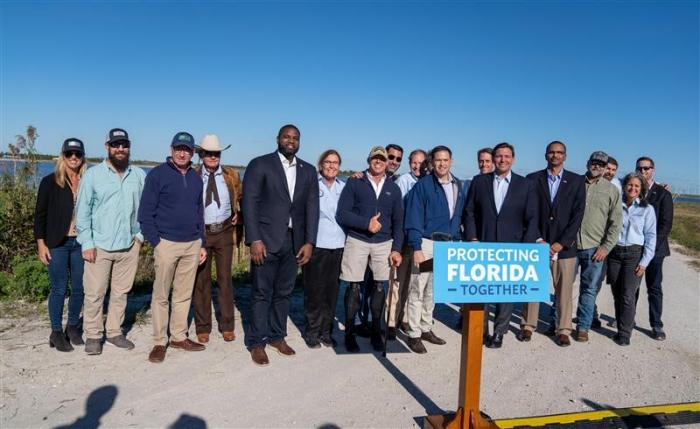Timeline
“Florida reached a historic agreement with the Trump Administration earlier this year to expedite and advance Everglades restoration,” said Governor Ron DeSantis. “Today, I was pleased to announce a milestone in Everglades restoration made possible by our cooperation with the federal government. Florida is now breaking ground on the new EAA Inflow Pump Station, an essential component of the EAA Reservoir Project. This is the second Everglades restoration project to commence since the agreement with the Army Corps of Engineers last summer, which has empowered Florida to step up our Everglades restoration efforts. Today’s groundbreaking marks the 80th milestone event in Everglades restoration that has taken place since 2019, thanks to our leadership and commitment to getting this done.”
Governor Ron DeSantis Celebrates Continued Everglades Restoration Momentum and Breaks Ground on New Inflow Pump Station at Critical EAA Reservoir Project
Governor Ron DeSantis attended the groundbreaking for the new inflow pump station at the critical Everglades Agricultural Area (EAA) Reservoir Project. The EAA Reservoir, located south of Lake Okeechobee, will store over 78 billion gallons of water and deliver up to 470 billion gallons of clean water annually to the Everglades and Florida Bay. It also supports the Biscayne Aquifer, the primary source of drinking water for South Florida.
For decades, Florida’s water system was altered to prevent flooding, but at the cost of cutting off the natural flow of water to the Everglades. The EAA Reservoir Project is designed to correct that — redirecting water south, restoring ecosystems and significantly reducing harmful discharges to the Caloosahatchee and St. Lucie estuaries. Once complete, the EAA Reservoir will provide lasting benefits for Florida’s coastal communities and unique natural environment.
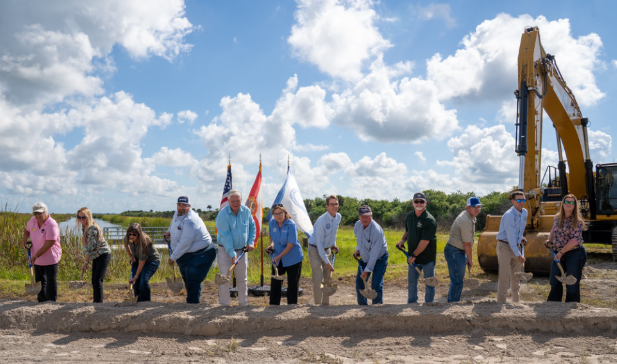
South Florida Water Management District Celebrates the Expansion of an Important Water Storage and Water Quality Project in Glades County
The South Florida Water Management District, the Florida Department of Environmental Protection, Glades County and many other state and local stakheolders broke ground on the second phase of the Lake Hicpochee Project.
The Lake Hicpochee Project is part of the Northern Everglades and Estuaries Protection Program and will provide benefits including reducing harmful discharges to the Caloosahatchee Estuary, improving water quality and providing additional water storage capacity in the region.
The State of Florida has completed, broken ground or reached a major milestone on more than 75 Everglades restoration projects since 2019.
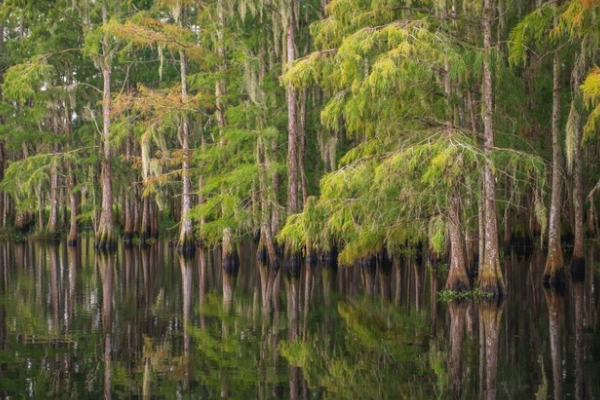
Governor Ron DeSantis and Florida Cabinet Approve $167 Million to Protect More Than 20,000 Acres of Conservation Lands
Governor Ron DeSantis and the Florida Cabinet approved the protection of 20,086 acres of critical conservation lands, representing a $167.25 million investment in Florida’s natural resources. Six of the properties are within the Florida Wildlife Corridor and another will expand Cary State Forest in Duval County.
The Governor and Cabinet also approved the conveyance of a 2.63-acre parcel in Miami-Dade County adjacent to the Freedom Tower for the Donald J. Trump Presidential Library.
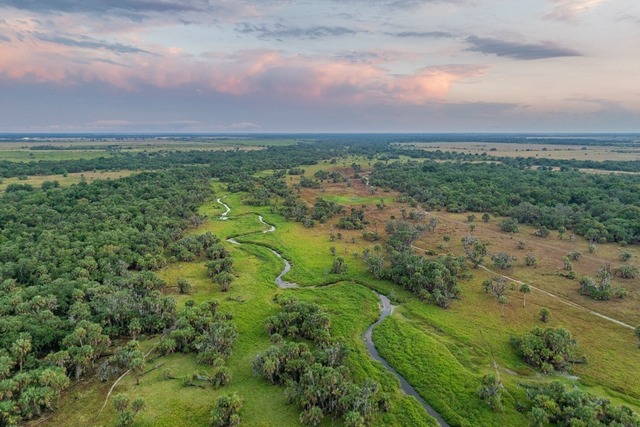
DEP Secures 200th Conservation Easement, Protecting Over 364,000 Acres of Florida’s Working Lands
The Florida Department of Environmental Protection (DEP) is celebrating a major milestone: the Florida Forever Program has secured its 200th conservation easement, protecting 364,117 acres across the state. This milestone comes as the program celebrates its 25th anniversary.
“Conservation easements are one of the most important tools we have to protect Florida’s lands and waters,” said DEP Secretary Alexis A. Lambert. “From working farms and ranches to wildlife habitats and scenic landscapes, Florida Forever safeguards the resources that make our state special.”
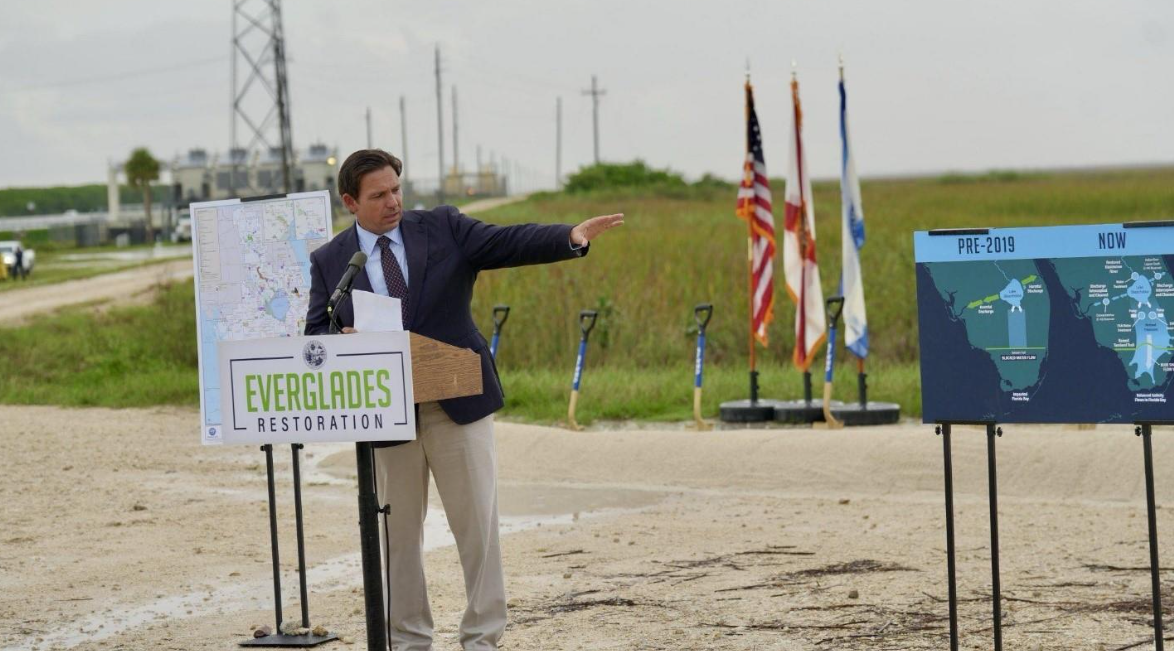
Florida Breaks Ground on First Project Under New Everglades Agreement
Within eight weeks of assuming responsibility for the Blue Shanty Flow Way under the new agreement with the U.S. Department of the Army, the State of Florida broke ground on the project, advancing its expected completion by about two years. Located in Miami-Dade County, the Blue Shanty Flow Way will help ensure more water flows from the to-be-completed EAA Reservoir south into Everglades National Park and Florida Bay. It is the first project launched under the July 18, 2025, state-federal agreement to accelerate restoration of America’s Everglades.
“We have completed the Crane Creek/M-1 Canal Flow Restoration Project — a prime example of how strategic state investment delivers measurable environmental benefits,” said Governor Ron DeSantis. “I’m proud that Florida demonstrates responsible stewardship of our natural resources. More projects are on the way that will ensure we have abundant, clean water for future generations.”
Crane Creek/M-1 Canal Flow Restoration Project Completed
Governor DeSantis joined state and local leaders to announce the completion of the Crane Creek/M-1 Canal Flow Restoration Project in Brevard County, marking a major step toward improving water quality in the Indian River Lagoon and restoring natural water flow to the St. Johns River Basin.
Constructed over a century ago, the M-1 Canal redirected stormwater from over 5,300 acres into the lagoon. Led by the St. Johns River Water Management District in partnership with state and local agencies, the project installed a new weir, pump stations, a pipeline and a stormwater treatment area to:
Prevent an estimated 24,000 pounds of nitrogen and 3,100 pounds of phosphorus from entering the lagoon each year.
Restore the natural westward flow to the St. Johns River Basin.
Provide up to 7 million gallons of fresh water per day for downstream users.
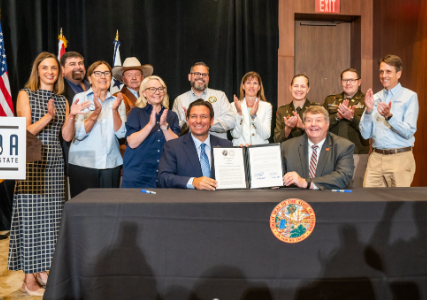
FLORIDA SECURES LANDMARK AGREEMENT WITH U.S. DEPARTMENT OF THE ARMY TO ACCELERATE EVERGLADES RESTORATION
The state of Florida and the U.S. Department of the Army have reached a landmark agreement that allows Florida to take the lead on key components of the federally funded Comprehensive Everglades Restoration Plan, including the “crown jewel” of Everglades restoration — the Everglades Agricultural Area Reservoir.
The EAA Reservoir, located south of Lake Okeechobee, will store over 78 billion gallons of water — larger than Manhattan — and deliver up to 470 billion gallons of clean water annually to the Everglades and Florida Bay. It also supports the Biscayne Aquifer, the primary source of drinking water for South Florida.
"Under Governor DeSantis’ leadership we’ve invested more towards restoration and are seeing meaningful results — on time, under budget and with strong returns for Florida’s taxpayers,” said DEP Secretary Alexis A. Lambert.
GRAND OPENING OF C-43 RESERVOIR, A MAJOR MILESTONE IN EVERGLADES RESTORATION
Governor DeSantis marked the official opening of the Caloosahatchee (C-43) Reservoir, one of the most significant Everglades restoration projects in Florida history. This 10,000-acre reservoir will improve water quality, protect coastal ecosystems and expand Florida’s water storage capacity.
“Since taking office, Governor DeSantis has signed seven state budgets that consistently prioritize environmental protection, demonstrating his administration’s long-term commitment to safeguarding Florida’s natural resources,” said DEP Secretary Alexis A. Lambert. “These investments reflect a smart balance between conservation and growth, recognizing that protecting our environment is not just good policy — it is essential to keeping Florida a place where families, businesses and communities can thrive.”
FISCAL YEAR 2025-26 BUDGET INVESTS BILLIONS IN EVERGLADES RESTORATION AND WATER QUALITY
Governor DeSantis signed the Fiscal Year 2025-26 budget, investing $1.4 billion to advance Florida’s historic efforts to restore the Everglades and for targeted water quality improvements. Additional funding will support projects that strengthen critical infrastructure, enhance resilience and ensure reliable water supplies for Florida’s growing population and economy.
View Full Press Release
“For years, DEP has worked closely with stakeholders across Florida to assess water quality, establish pollution reduction goals and identify projects and strategies to achieve meaningful, measurable improvements,” said DEP Secretary Alexis A. Lambert. “Today’s adoption of these plans is a significant milestone made possible through input, collaboration and dedication.”
DEP ADVANCES STATEWIDE WATER QUALITY PROTECTIONS WITH UPDATED RESTORATION PLANS
DEP has adopted 28 updated nutrient Basin Management Action Plans (BMAPs), marking a major advancement in Florida’s commitment to improving water quality and fulfilling the requirements of the Clean Waterways Act.
Developed in collaboration with local governments, state agencies, utilities and other key stakeholders, each plan sets clear pollution reduction goals and identifies targeted projects and strategies to improve the health of Florida’s waterbodies over the long-term.
View Full Press Release
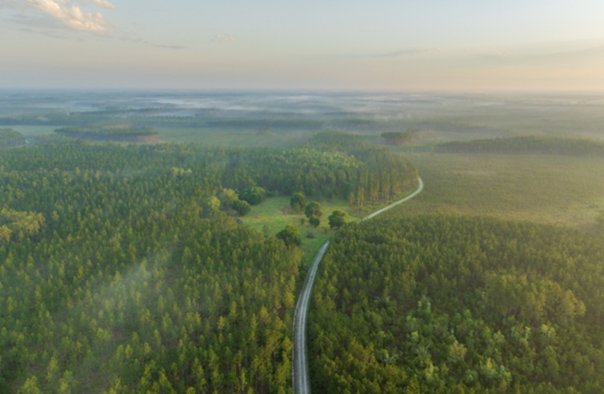
GOVERNOR DESANTIS AND FLORIDA CABINET CONSERVE OVER 78,000 ACRES OF CONSERVATION LANDS
Governor Ron DeSantis and the Florida Cabinet the Florida Cabinetapproved the protection of more than 78,000 acres of lands through Florida, including over 76,000 in rural Florida within the Ocala-to-Osceola Wildlife Corridor. These key acquisitions close the final, major gap in a 100-mile, 1.6-million-acre network of public and private lands connecting the Ocala and Osceola National Forests.
View Full Press Release
“DEP remains committed to securing Florida’s water future through proactive investments in infrastructure and natural resource protection,” said DEP Secretary Alexis A. Lambert.
DEP AWARDS $25 MILLION TO STRENGTHEN WATER SUPPLY INFRASTRUCTURE IN NORTHWEST FLORIDA
DEP has awarded $25 million through the Local Government Water Supply Pilot Grant Program to fund 13 projects that will improve water supply infrastructure in Northwest Florida. These projects will help enhance water supply resilience in the region, reduce water loss and ensure residents have dependable access to drinking water and essential resources for firefighting.
A list of Local Government Water Supply Pilot Grant projects selected for Fiscal Year 2024-25 can be found at ProtectingFloridaTogether.gov/Grants.
“With this investment, we are enhancing our ability to take proactive steps to prevent harmful algal blooms and, if they were to occur, to respond to blooms more effectively than ever before, protecting both our natural resources and local communities,” said DEP Secretary Alexis A. Lambert.
DEP AWARDS $10 MILLION FOR INNOVATIVE TECHNOLOGIES TO COMBAT HARMFUL ALGAL BLOOMS
DEP awarded $10 million in grants for 15 projects focused on mitigating the effects of harmful algal blooms, including blue-green algae. These projects will deploy and evaluate cutting-edge technologies to prevent bloom occurrences and implement treatment strategies to minimize environmental and economic impacts.
A list of Innovative Technology Grant projects selected for Fiscal Year 2024-25 can be found at ProtectingFloridaTogether.gov/Grants.
View Full Press Release
“The Florida Keys are a national treasure, home to one of the most unique and ecologically significant marine environments in the world,” said DEP Secretary Alexis A. Lambert. “With a local economy built on the health of these waters, protecting this area is not just an environmental priority, it’s an economic and cultural necessity.”
DEP AWARDS OVER $9 MILLION TO IMPROVE WATER QUALITY AND ECOSYSTEMS IN THE FLORIDA KEYS
DEP has awarded $9.3 million through the Florida Keys Area of Critical State Concern Grant Program to support seven projects that will improve water quality, restore natural resources and enhance environmental resilience. These investments will help Florida Keys communities tackle wastewater management, stormwater treatment and canal restoration projects to protect the region’s renowned marine ecosystem.
For a full list of Florida Keys Area of Critical State Concern Grant projects selected for Fiscal Year 2024-25 funding, visit ProtectingFloridaTogether.gov/Grants.
View Full Press Release
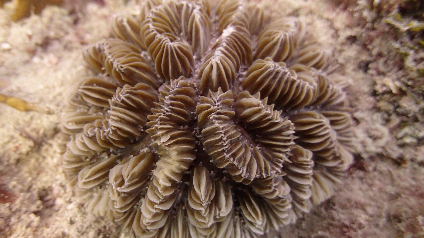
DEP AWARDS $9.5 MILLION TO PROTECT AND RESTORE FLORIDA’S CORAL REEF
DEP awarded $9.5 million for 10 projects focused on enhancing coral nursery infrastructure and expanding operations, furthering Florida’s efforts to restore the only near-shore barrier reef in the continental U.S. Through Florida’s Coral Reef Restoration and Recovery Initiative Grant Program, DEP is expanding coral restoration efforts in collaboration with in-state partners and propagating tens of thousands of resilient coral colonies each year. In its first two years, the initiative has awarded grants to outplant at least 2,000 corals annually, with partners such as the Florida Aquarium producing 20,000 new coral recruits each year.
A list of Florida’s Coral Reef Restoration and Recovery Initiative Grant projects selected for Fiscal Year 2024-25 can be found at ProtectingFloridaTogether.gov/Grants.
View Full Press Release
![]()
DEP AWARDS OVER $60 MILLION TO RESTORE AND PROTECT FLORIDA'S ICONIC SPRINGS
DEP awarded more than $60 million in grants for 17 projects aimed at restoring Florida’s world-renowned springs. These projects will enhance spring flow and improve water quality through wastewater upgrades and other enhancements. Collectively, they are projected to reduce Total Nitrogen by an additional 51,285 pounds per year.
For a full list of Springs Restoration Grant projects selected for Fiscal Year 2024-25, visit ProtectingFloridaTogether.gov/Grants.
View Full Press Release
GOVERNOR DESANTIS AWARDS OVER $389 MILLION TO PROTECT FLORIDA'S WATER RESOURCES
Governor Ron DeSantis announced the awards of more than $389 million in grants to improve water quality and quantity across the state. This includes $189 million in Water Quality Improvement Grants and $55 million in Alternative Water Supply Grants. The Governor also awarded $100 million through the Indian River Lagoon Protection Program, $25 million through the Caloosahatchee Watershed Grant Program and $20 million through the Biscayne Bay Water Quality Improvement Grant Program.
This includes $189 million in Water Quality Improvement Grants and $55 million in Alternative Water Supply Grants. The Governor also awarded $100 million through the Indian River Lagoon Protection Program, $25 million through the Caloosahatchee Watershed Grant Program and $20 million through the Biscayne Bay Water Quality Improvement Grant Program.
View Full Press Release
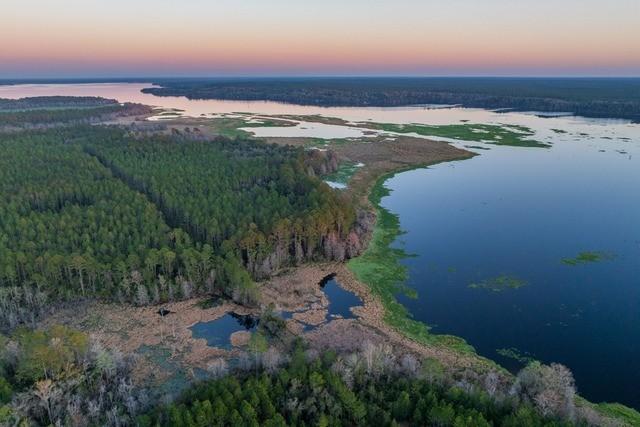
GOVERNOR DESANTIS AND CABINET EXPAND FLORIDA’S PROTECTED LANDS WITH MAJOR CONSERVATION INVESTMENT
Governor Ron DeSantis and the Florida Cabinet approved the protection of 34,595 acres of critical conservation lands through the Florida Forever Program. This investment includes five acquisitions, all located within the Florida Wildlife Corridor, securing habitat for Florida’s iconic wildlife and enhancing landscape connectivity. Two of these properties are within the Caloosahatchee-Big Cypress Corridor, reinforcing critical Everglades and Florida panther habitat, while another expands protection within the Ocala-to-Osceola Wildlife Corridor.
View Full Press Release
“From the onset of his tenure, Governor Ron DeSantis has delivered on his commitment to restoring the Everglades, prioritizing water quality investments that support our future generations and strengthening our coastlines from the impacts of hurricanes,” said DEP Secretary Alexis A. Lambert. “With this recommended budget, Governor DeSantis will have invested a record $8 billion in Everglades and water quality improvement efforts since 2019. As Secretary, I look forward to continuing the department’s mission and being a good steward of the resources taxpayers have entrusted us to invest wisely.
GOVERNOR DESANTIS' BUDGET RECOMMENDATIONS DELIVER ON HIS COMMITMENT TO CONSERVATION
Governor Ron DeSantis’ Focus on Fiscal Responsibility Budget for Fiscal Year 2025-26 continues his administration’s record investments in the Everglades, and infrastructure projects to support water quality and coastal resilience.
“I’m proud to keep advancing these efforts in Everglades restoration and water quality, which will have lasting benefits to our state for years to come,” said Governor Ron DeSantis. “I promised to leave Florida better than we found it, and we’re keeping that promise for future generations.”
"Floridians understand the Everglades better than anyone else. We live, work and recreate here, and we are committed to the land that sustains this," said Florida Department of Environmental Protection Secretary Alexis A. Lambert. "Florida has the experience, urgency and determination to get the job done. We have proven our ability to manage restoration projects efficiently.”
GOVERNOR DESANTIS HIGHLIGHTS EVERGLADES RESTORATION, CALLS FOR GREATER STATE AUTHORITY OVER CERP
Governor Ron DeSantis provided updates on Florida’s efforts to restore America’s Everglades and enhance the supply and quality of the state’s water resources. He also reaffirmed Florida’s commitment to working with the incoming Trump Administration to accelerate critical restoration projects by seeking authority over implementation from the U.S. Army Corps of Engineers.
View Full Press Release
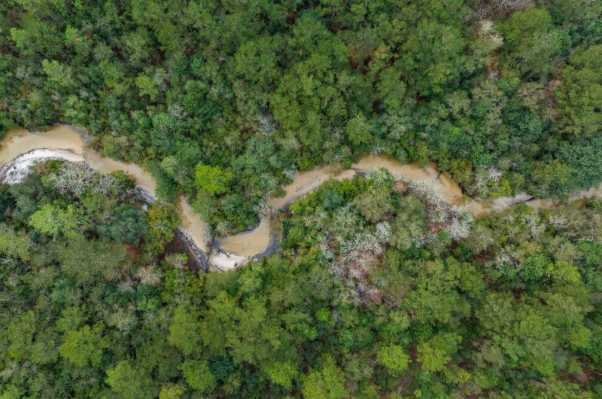
GOVERNOR DESANTIS AND CABINET APPROVE $317 MILLION INVESTMENT TO CONSERVE FLORIDA’S NATURAL RESOURCES
Governor Ron DeSantis and the Florida Cabinet approved a $317 million investment to protect Florida’s lands, including $111 million to acquire over 24,000 acres of conservation lands through the Florida Forever Program and $206 million to preserve over 62,000 acres of farms and ranches through the Rural and Family Lands Protection Program.
View Full Press Release
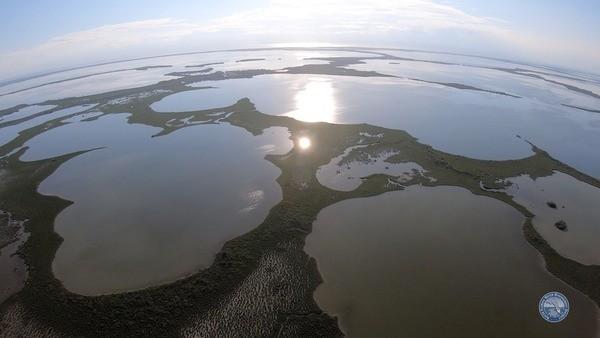
SFWMD GOVERNING BOARD APPROVES TWO NEW PROJECTS TO SEND MORE CLEAN WATER SOUTH
The South Florida Water Management District (SFWMD) approved two key projects to accelerate clean water flow to the Everglades.
The district will take over construction of the S-355 West structure, a key feature of the Central Everglades Planning Project, allowing work to begin in 2025 and finish ahead of schedule. This structure will support the Blue Shanty Flow Way to help restore natural water flows between the Central Everglades, Everglades National Park and Florida Bay. In addition, to mitigate restoration delays related to the critically endangered Cape Sable Seaside Sparrow, the district is supporting a conservation breeding program to aid in this species’ recovery.
View Full Press Release

FLORIDA COMPLETES CONSTRUCTION PHASE OF EVERGLADES RESTORATION STRATEGIES PROJECT
The South Florida Water Management District, in partnership with the Miccosukee Tribe, Seminole Tribe, U.S. Environmental Protection Agency and DEP completed the C-139 Flow Equalization Basin Project. This 11,000-acre-foot reservoir stores local basin runoff from the C-139 Basin and controls the flow of water to the adjacent Stormwater Treatment Area 5/6. It will also help improve water quality by removing nutrients from stormwater before it flows south to the Everglades.
View Full Press Release
Governor DeSantis Appoints Alexis A. Lambert Secretary of the Department of Environmental Protection
After 17 years of dedicated service to the state of Florida, DEP Secretary Shawn Hamilton announced that he will be transitioning to the private sector. Governor Ron DeSantis has appointed Alexis A. Lambert as the new Secretary.
View Full Press Release View Message from Former Secretary Shawn Hamilton
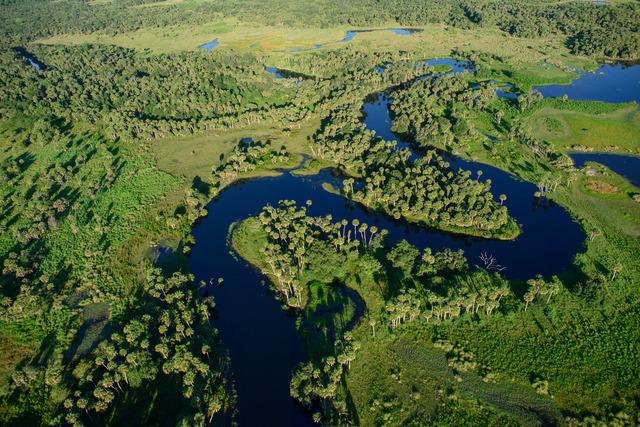
DEP ADDS MORE THAN 1,300 ACRES TO THE LITTLE BIG ECON STATE FOREST
DEP acquired a 1,361-acre property through the completion of the Yarborough Ranch Florida Forever Project. Located in southeastern Seminole County, this property provides an important linkage in the Florida Wildlife Corridor to existing conservation lands, including the Little Big Econ State Forest.
The property is almost entirely within the Geneva Freshwater Lens, which provides drinking water for county residents. Conserving the property protects this unique and valuable hydrologic resource, helps to safeguard the health and diversity of the regional ecosystem and prevents further development.
“Governor DeSantis has once again demonstrated his strong commitment to Florida’s environment by funding critical, scientifically sound projects to protect and restore our water quality, fortify our coastlines and expand our unrivaled conservation lands,” said DEP Secretary Shawn Hamilton. “Over the coming year, we look forward to maintaining our momentum in these efforts, including expediting projects to restore Florida’s Everglades, funding projects through the Resilient Florida Grant Program and delivering on the Governor’s vision of increasing public access to our conservation lands through additional outdoor recreation, camping and lodging options at Florida’s award-winning state parks. The prioritization and investment in Florida’s environmental protection goals have made them a reality now and in the future. I am excited for DEP and our partners to maintain this momentum for Florida’s residents, visitors, resources and economy.”
GOVERNOR DESANTIS SIGNS FISCAL YEAR 2024-25 “FOCUS ON FLORIDA’S FUTURE” BUDGET
Governor Ron DeSantis signed the Focus on Florida’s Future Budget for Fiscal Year 2024-25, representing the most significant single-year investment in Everglades restoration projects in Florida’s history. The budget invests a historic $3.1 billion to continue the state’s momentum to expedite critical Everglades Restoration projects, employ sound science to protect and restore Florida’s waterways, and fund infrastructure projects to improve Florida’s water quality and supply.
“Florida’s unique environmental challenges demand bold solutions, and international cooperation is a significant step in that direction,” said DEP Secretary Shawn Hamilton. “We remain steadfastly committed to protecting Florida, and I look forward to a productive partnership that will enhance that mission by collaborating with some of South Korea’s finest scientific minds in our fight against harmful algal blooms.”
STATE OF FLORIDA SIGNS MOU WITH SOUTH KOREAN RESEARCH AGENCY TO PROMOTE INFORMATION SHARING ON HARMFUL ALGAL BLOOMS
DEP signed a Memorandum of Understanding (MOU) with South Korea’s National Institute of Environmental Research to strengthen international collaboration on harmful algal bloom management and response, including for blue-green algae. This shared work will further the state’s capabilities to effectively respond to and prevent future harmful algal blooms that impact the state.
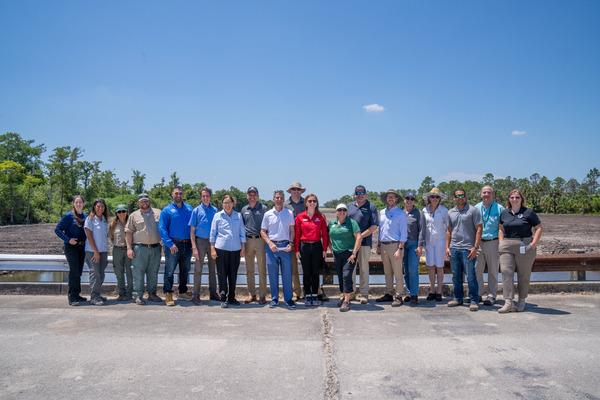
SFWMD AND USACE CELEBRATE MAJOR MILESTONE FOR KEY EVERGLADES RESTORATION PROJECT
The South Florida Water Management District and the U.S. Army Corps of Engineers along with many state officials and stakeholders celebrated the completion of an important component of the Picayune Strand Restoration Project — the plugging of the Faka Union Canal. Three out of the four canals are now plugged. The restoration project is expected to result in improved flows of water into Collier Seminole State Park, Ten Thousand Islands National Wildlife Refuge and the Rookery Bay National Estuarine Research Reserve.
“Planning for Florida’s future water needs necessitates a collaborative, balanced approach to ensure adequate water supplies for future generations,” said DEP Secretary Shawn Hamilton. “These projects are a prime example of state and local governments coming together to protect Florida’s water resources now and in the future.”
GOVERNOR DESANTIS AWARDS $60 MILLION FOR ALTERNATIVE WATER SUPPLY PROJECTS
Governor DeSantis announced the award of $60 million in alternative water supply funding for 12 projects that will make available more than 28 million gallons of potable water each day. Specifically, $37 million of this year’s funding is dedicated to projects in the Central Florida Water Initiative area. This planning region, which includes Orange, Osceola, Polk, Seminole and southern Lake counties, has known water constraints.
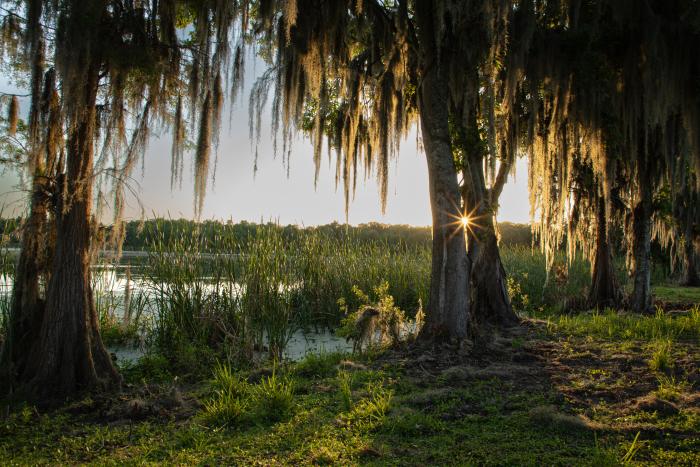
GOVERNOR DESANTIS HIGHLIGHTS INVESTMENTS TO STRENGTHEN FLORIDA’S COMMITMENT TO CONSERVING OUR NATURAL RESOURCES
Governor DeSantis announced the award of $60 million in alternative water supply funding for 12 projects that will make available more than 28 million gallons of potable water each day. Alternative Water Supply Grants fund projects such as reclaimed water, aquifer recharge and water conservation.
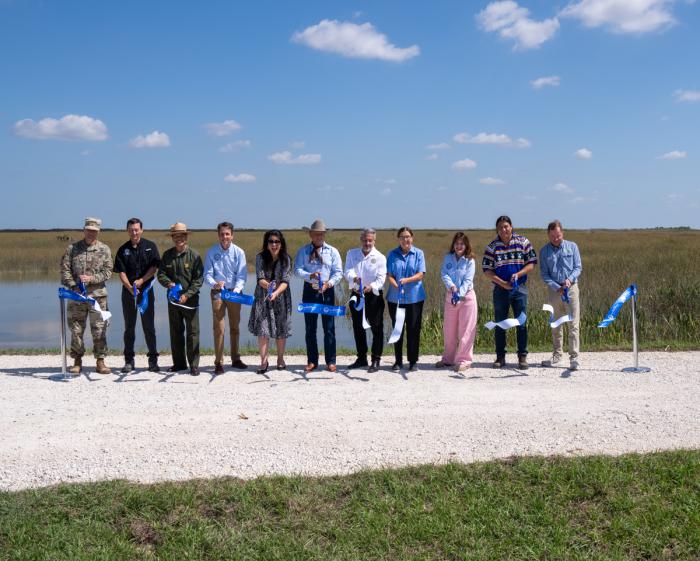
SFWMD Celebrates Completion of key everglades restoration project
The South Florida Water Management District and the U.S. Army Corps of Engineers joined local, state, federal and tribal officials as well as stakeholders to cut the ribbon on the Central Everglades Planning Project (CEPP) New Water Seepage Barrier Wall Project, which was completed eight months ahead of schedule. The project supports ongoing restoration efforts to move water south through the Everglades and into Florida Bay while mitigating potential flooding impacts in communities outside of Everglades National Park.
“In recent years, our state has made unprecedented investments to protect our wild spaces, improve water quality and preserve our natural resources,” said DEP Secretary Shawn Hamilton. “The consistent revenue stream from this legislation will allow the state to double down on its efforts to protect Florida’s natural resources for generations to come.”
GOVERNOR DESANTIS SIGNS MAJOR LEGISLATION TO DEDICATE GAMING COMPACT REVENUES TO PRESERVE AND PROTECT FLORIDA’S ENVIRONMENT
Governor DeSantis signed Senate Bill 1638, which directs 96% of the revenue generated from the Seminole Tribe Compact to fund flood control and water quality improvement, infrastructure, and the continued acquisition and management of Florida’s conservation lands.
“As we tackle environmental challenges, we understand that preparation and planning make all the difference,” said DEP Secretary Shawn Hamilton. “We are extremely thankful that this administration has prioritized environmental initiatives, because without them, we might be facing a different outcome for Florida’s Coral Reef.”
Governor Desantis announces first awards through florida’s coral reef restoration and recovery initiative
Governor DeSantis awarded $9.5 million through Florida’s Coral Reef Restoration and Recovery Initiative to bolster academic and private partnerships to safeguard Florida’s Coral Reef. This funding will enhance coral recovery, including propagation and outplanting capacities critical to the health and longevity of Florida’s Coral Reef.
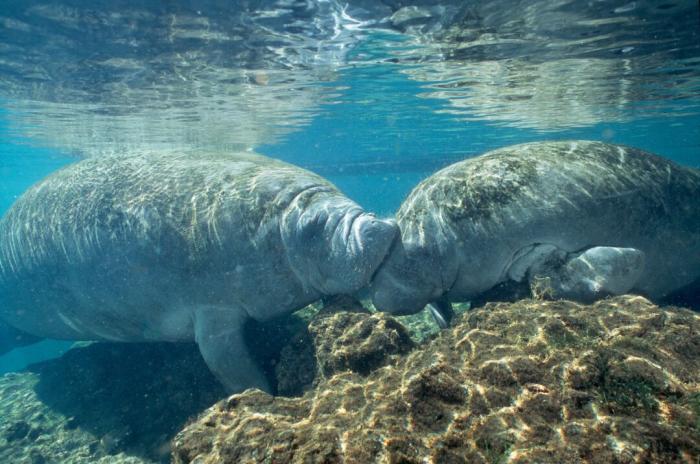
GOVERNOR DESANTIS HIGHLIGHTS FLORIDA’S SUCCESSFUL EFFORTS TO PROTECT FLORIDA’S MANATEES
Governor DeSantis has prioritized funding for manatees and water quality improvements that enhance manatee habitats, investing over $50 million in manatee programs and more than $1.8 billion in water quality improvements since 2019. As a result, in 2023, Florida manatees had the lowest mortality rate since 2017.
“The EAA Reservoir is a critical component of Everglades restoration and Governor DeSantis has led the charge on getting this project done,” said DEP Secretary Shawn Hamilton. “Restoring America’s Everglades is one of the most ambitious hydrological restoration projects ever undertaken and will restore the natural flow of clean water south to where it’s needed most.”
STATE HOLDS RIBBON-CUTTING FOR EAA RESERVOIR STORMWATER TREATMENT AREA
The SFWMD held a ribbon-cutting ceremony celebrating the filling of the first cell of the 6,500-acre Everglades Agricultural Area (EAA) Stormwater Treatment Area, which will store and clean water flowing from Lake Okeechobee before it is sent south. The EAA Reservoir is the crown jewel of Everglades restoration, and will help move water south which nourishes the Everglades, replenishes Florida’s aquifers and supports the Florida Bay. Additionally, the reservoir will help to reduce harmful discharges to the St. Lucie River, the Caloosahatchee River and the Lake Worth Lagoon.
“Biscayne Bay is Florida’s largest estuary and it has a direct connection to Florida’s Coral Reef,” said DEP Secretary Shawn Hamilton. “Restoring this vital ecosystem is critical to not only ensure healthy fisheries, but also to safeguard the natural buffer along this populated coastline.”
GOVERNOR DESANTIS AWARDS $20 MILLION FOR WATER QUALITY IMPROVEMENT PROJECTS IN BISCAYNE BAY
Governor DeSantis announced the award of $20 million to strengthen ongoing efforts to restore water quality in Biscayne Bay. Selected projects include wastewater improvements (including septic-to-sewer), stormwater management and other projects that will help improve water quality in the bay.
“Dedicated funding for innovative technologies is a critical component of our multi-faceted approach to protecting water quality in Florida,” said DEP Secretary Shawn Hamilton. “I am thankful for the backing of the Governor, his administration and our lawmakers for their commitment to address the challenges we face head on.”
GOVERNOR DESANTIS AWARDS NEARLY $10 MILLION FOR INNOVATIVE TECHNOLOGIES TO COMBAT HARMFUL ALGAL BLOOMS
Governor DeSantis announced the award of nearly $10 million for innovative technologies to combat harmful algal blooms. Funding is being provided for 10 projects that will mitigate the effects and impacts of harmful algal blooms, including blue-green algae. Over the past five years, the state has invested in over 40 innovative technologies to detect, prevent, clean up and mitigate harmful algal blooms in a cost-effective, safe way.
“The Caloosahatchee River and Estuary, along with other key waterbodies, is vital to the environment and way of life for Southwest Florida,” said DEP Secretary Shawn Hamilton. “With funding from the Governor and Florida Legislature, these priority water quality improvement projects are being implemented and progress is being realized.”
GOVERNOR DESANTIS AWARDS MORE THAN $30 MILLION TO IMPROVE WATER QUALITY IN THE CALOOSAHATCHEE RIVER AND ESTUARY
Governor DeSantis announced the award of more than $30 million in state funding to support six water quality projects in the Caloosahatchee River Watershed. These projects will help address excess nutrients, which are known to contribute to increased algal blooms, by investing in wastewater and stormwater infrastructure.
“Governor DeSantis has made our state’s water quality a top priority,” said DEP Secretary Shawn Hamilton. “The state of Florida continues to provide communities with the means to tackle water quality improvement projects, with the goal of safeguarding and restoring our natural and water resources.”
GOVERNOR DESANTIS AWARDS $200 MILLION FOR PROJECTS TO RESTORE FLORIDA’S WATER RESOURCES
Governor DeSantis announced the award of $210 million through the newly expanded Water Quality Improvement Grant Program for 27 statewide projects that will reduce harmful nutrients in Florida’s waterways. The awards include septic-to-sewer projects, wastewater treatment upgrades, stormwater projects, wastewater improvement projects and a regional agricultural project, and will reduce total nitrogen loading by more than 1 million cumulative pounds per year.
Selected projects will address the root causes of nutrient pollution by investing in wastewater treatment upgrades, septic-to-sewer connections, stormwater treatment and other needed restoration projects, thereby reducing total nitrogen loading in region by more than 375,000 pounds per year.
“The Indian River Lagoon is one of the state’s most iconic waterways, and we are committed to meeting the challenges it faces head on,” said DEP Secretary Shawn Hamilton. “With the historic funding secured by Governor DeSantis and the Florida Legislature, we are able to implement important projects to improve water quality in the Indian River Lagoon.”
GOVERNOR DESANTIS AWARDS $100 MILLION FOR PROJECTS TO RESTORE THE INDIAN RIVER LAGOON
Governor DeSantis announced the first awards through the newly established Indian River Lagoon (IRL) Protection Program. $100 million in state funding has been provided to support 21 priority water quality projects that will reduce the amount of nutrients entering the IRL.
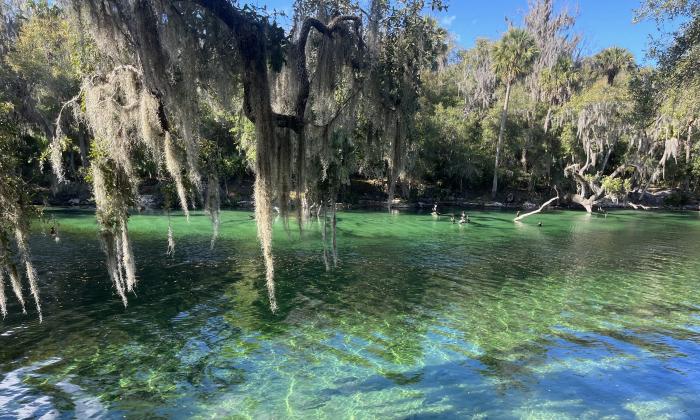
“Thanks to Governor DeSantis for once again continuing to protect one of Florida’s greatest assets — our invaluable springs,” said DEP Secretary Shawn Hamilton. “In partnership with our water management districts, local governments and community leaders, implementation of these projects will help to continue the protection of this precious resource for generations to come.”
GOVERNOR DESANTIS AWARDS OVER $57 MILLION TO PROTECT FLORIDA’S SPRINGS
Governor DeSantis announced the award of over $57 million for 23 statewide springs restoration projects to protect Florida’s iconic springs, as well as increase spring flow and improve water quality. Florida’s springs attract visitors from across the world and the preservation of these springs play an important role in the economic resilience of the state.
DEP and four of Florida’s water management districts have identified projects such as wastewater, stormwater, pollution control projects and water-quality projects to protect and restore our springs. Additionally, these projects will help conserve and acquire land in spring recharge zones to prevent nutrients from entering the groundwater that feeds our springs.

DEP AQUATIC PRESERVES EARNS AWARD FOR BEST RESTORED SHORELINE
The American Shore and Beach Preservation Association named the Cat Point Living Shoreline project in Apalachicola National Estuarine Research Reserve as one of five recipients for the 2023 Best Restored Shores Award.As part of the restoration project, 16 breakwater structures – stretching almost 1,300 feet – were established to protect the shoreline against flooding and storm surge while also providing critical habitat for oyster restoration. Behind the breakwaters, 20,634 plants were transplanted to create almost an acre of new salt marsh habitat.
“Florida’s coastlines are a part of our state’s invaluable and unique identity and living shoreline projects like Cat Point have a vital role in Florida’s comprehensive approach to fortifying our shorelines and communities,” said DEP Secretary Shawn Hamilton. “The strategies used in this project are already being replicated for similar marsh habitat restoration projects, including one ongoing by the U.S. Army Corps of Engineers in South Carolina.”
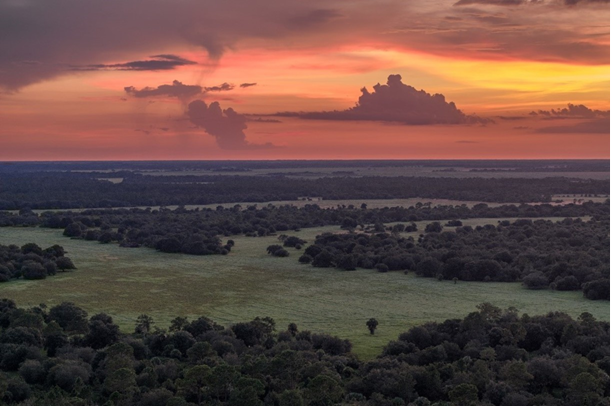
Devil’s Garden Florida Forever Project | Photo by Carlton Ward Jr./Wildpath
GOVERNOR DESANTIS AND THE FLORIDA CABINET INVEST $141 MILLION TO PROTECT FLORIDA’S NATURAL RESOURCES
Governor DeSantis and the Florida Cabinet approved a $141 million investment to expand Florida’s Wildlife Corridor by more than 42,000 acres through the Florida Forever and Rural and Family Lands Protection programs. More than 17,000 acres border Big Cypress National Preserve and will advance Everglades restoration efforts. All projects advance key protections of Florida’s water resources and recharge areas.
“We appreciate Governor DeSantis and the Florida Cabinet for their unwavering support to preserve our landscapes and native habitats,” said DEP Secretary Shawn Hamilton. “Land conservation is critical to the protection of our natural landscapes and water resources which are integral for healthy ecosystems and wildlife, outdoor public recreation, and water supply.”
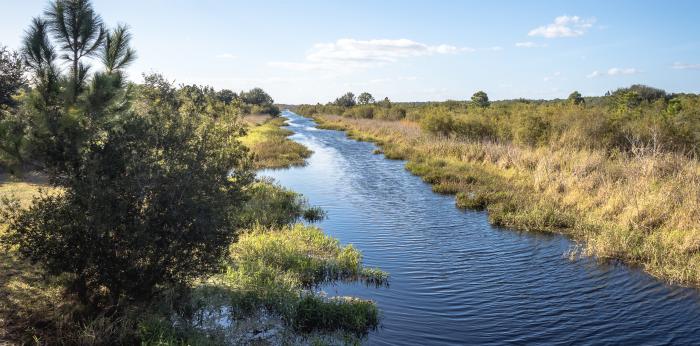
"Under the leadership of Governor DeSantis, the state is taking an all-hands-on-deck approach to disaster response," said DEP Secretary Shawn Hamilton. "We are ready to utilize our emergency resources and work together across state agencies to respond to and continue recovery in the hardest hit areas."
GOVERNOR DESANTIS DIRECTS THE DEP TO EXPEDITE WATERWAY DEBRIS REMOVAL FOLLOWING HURRICANE IDALIA
Governor DeSantis directed DEP to undertake the removal of storm debris from waterways in the Big Bend region following Hurricane Idalia. Debris, especially in coastal areas, not only poses environmental concerns, such as water quality, flooding and navigational hazards, but also can affect Florida’s economy. For the Big Bend region, this includes the fishing and tourism industries. To ensure the state’s ability to quickly respond to storm damage, DEP has utilized a contract already in place to task AshBritt Inc. with the removal of debris in waterways, including fallen trees, vegetation and construction material from damaged homes and properties.
“We are grateful for Governor DeSantis’ steadfast dedication to the resilience of our state,” said DEP Secretary Shawn Hamilton. “The funding for this year’s Statewide Flooding and Sea Level Rise Resilience Plan enables us to prepare both inland and coastal communities for the risks of storm surge, rainfall-induced flooding, and hurricanes. It underscores the importance of protecting Florida’s natural resources and critical infrastructure.”
“Governor DeSantis’ bold vision for a Resilient Florida is driving progress toward safer and more productive communities,” said Chief Resilience Officer Dr. Wes Brooks. “By prioritizing infrastructure investments and leveraging nature-based solutions, this plan aims to safeguard communities, foster economic vitality and build a resilient future for Florida.”
GOVERNOR DESANTIS AWARDS $300 MILLION FOR PROJECTS TO PROTECT COMMUNITIES FROM IMPACTS OF FLOODING AND STORM SURGE
Governor DeSantis announced the award of $300 million in state funding for 71 new resilience and adaptation projects and three previously awarded projects to help prepare coastal and inland communities for the adverse impacts of flooding and storm surge.
“The Framework for Freedom budget is a testament to our unwavering commitment to protect Florida’s communities and secure their economic vitality,” said Governor DeSantis. “Florida is a storm-prone state, and following two back-to-back hurricanes last year, this funding advances Florida’s continuing efforts to strengthen our infrastructure and fortify against the impacts of storm surge and flooding.”

"On Governor DeSantis’ first days in office, he set a goal to improve Florida’s environment, signing Executive Order 19-12, and four years later, renewing his commitment with Executive Order 23-06, laying out an ambitious environmental agenda focused on Everglades restoration, water quality protection, and resilience of inland and coastal communities," said DEP Secretary Shawn Hamilton. "With the historic funding levels since 2019, Florida’s position as a national leader in environmental protection is further solidified. With this even greater funding in the Framework for Freedom budget, we will continue to achieve even more now for Florida’s environment."
GOVERNOR DESANTIS SIGNS FRAMEWORK FOR FREEDOM BUDGET, CONTINUING HISTORIC MOMENTUM FOR ENVIRONMENTAL PROTECTION
Governor DeSantis signed the Framework for Freedom Budget for Fiscal Year (FY) 2023-24, providing more than $3.8 billion to support Florida's environment by enhancing key protections, ensuring the health of Florida’s environment and supporting Florida’s economy, including over $1.6 billion for Everglades restoration and water quality, quantity and supply projects.
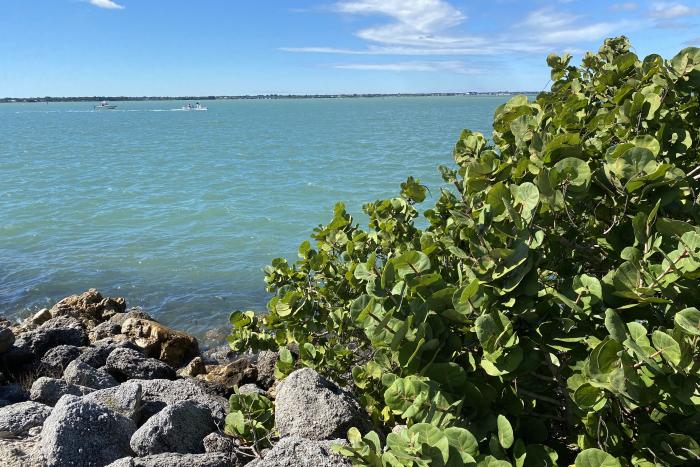
“We have made historic strides in environmental protection, water quality, and land conservation under the leadership of Governor DeSantis and with the support of the Florida legislature,” said DEP Secretary Shawn Hamilton. “This legislation will allow us to further expedite and advance these efforts.”
GOVERNOR DESANTIS SIGNS LEGISLATION TO PROTECT FLORIDA’S WATER RESOURCES AND SUPPORT CONSERVATION EFFORTS
Governor DeSantis signed House Bill 1379 to bolster his landmark common sense conservation agenda. This legislation enhances protections for the Indian River Lagoon, expands the existing wastewater grant program, strengthens Basin Management Action Plans, improves local government long-term comprehensive planning and creates dedicated funding for the state’s land conservation efforts, in line with the agenda Governor DeSantis set forth in Executive Order 23-06 (Achieving Even More Now for Florida’s Environment).
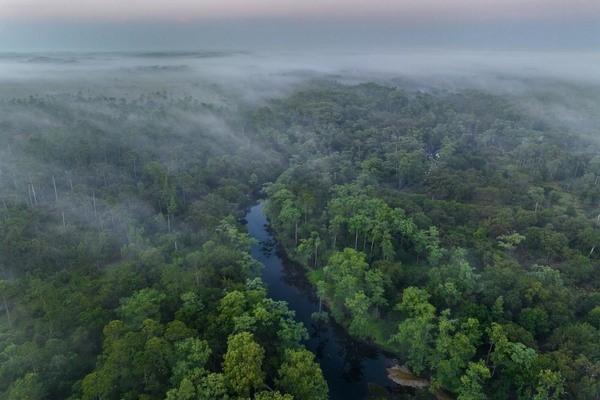
Fisheating Creek Ecosystem Florida Forever Project | Photo by Carlton Ward Jr./Wildpath
GOVERNOR DESANTIS AND THE FLORIDA CABINET INVEST $103 MILLION TO CONSERVE VITAL LANDS IN FLORIDA
Governor DeSantis and the Florida Cabinet approved the investment of over $103 million to conserve nearly 40,000 acres across the state through the Florida Forever and Rural and Family Lands Protection programs. Nearly all of the projects approved are within the Florida Wildlife Corridor, a designated network of connected lands that creates crucial linkages for wildlife habitat.
“We appreciate the support of Governor DeSantis and the Florida Cabinet for their unprecedented commitment to land conservation,” said DEP Secretary Shawn Hamilton. “These acquisitions help protect natural lands, provide linkages with other public lands, and safeguard areas needed for Florida’s wide-ranging wildlife.”
“As a result of the leadership of Gov. DeSantis and the Florida Legislature we are able to continue our unwavering support for recovery for these communities,” said DEP Secretary Shawn Hamilton. “This funding will accelerate restoration and address damages to critical wastewater and stormwater infrastructure as a result of these unprecedented back-to-back storms.”
GOVERNOR DESANTIS ANNOUNCES AWARD OF $100 MILLION TO IMPACTED COASTAL COMMUNITIES THROUGH HURRICANE STORMWATER AND WASTEWATER ASSISTANCE GRANT PROGRAM
Governor DeSantis announced the award of $100 million in funding for local governments that operate a stormwater or wastewater management system that were impacted by Hurricane Ian or Hurricane Nicole.
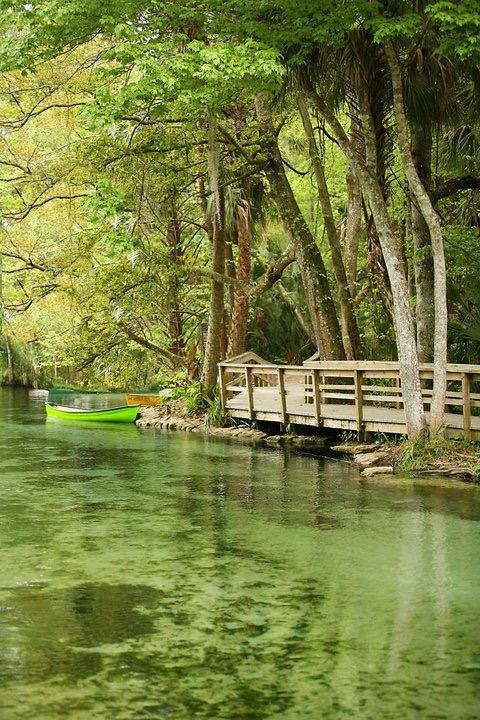
GOVERNOR DESANTIS ANNOUNCES AWARD OF MORE THAN $13.6 MILLION FOR INNOVATIVE TECHNOLOGIES TO CLEAN UP AND MITIGATE HARMFUL ALGAL BLOOMS
Governor DeSantis announced the award of more than $13.6 million for innovative technologies and short-term solutions to aid in the prevention, cleanup and mitigation of harmful algal blooms.
Upon taking office, Governor DeSantis created the Blue-Green Algae Task Force to address the issue of recurring algal blooms in the state of Florida. The task force recommended investment in a diverse portfolio of innovative technologies to detect, prevent, clean up and mitigate harmful algal blooms in a cost-effective, environmentally safe way.
“We all look forward to a future when harmful algal bloom events are less frequent and have a diminishing impact on our communities,” said DEP Secretary Shawn Hamilton. “To achieve this goal we know we must continue our investments in long-term water quality projects along with continued research and development of science-based mitigation and control technologies. With the continued support of Governor DeSantis and our lawmakers, I am confident that we will rise to this important challenge.”
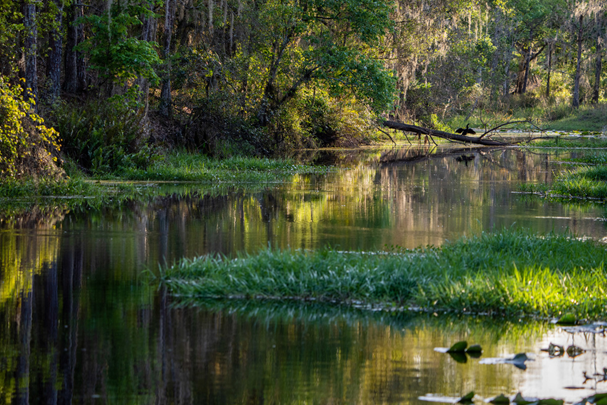
Photo by Katie Bryden/Wildpath in Osceola County is one of five parcels recently approved for acquisition through the Florida Forever Program.
GOVERNOR DESANTIS ANNOUNCES APPROVAL OF OVER $46.6 MILLION TO CONSERVE 21,000 ACRES TO FURTHER THE FLORIDA WILDLIFE CORRIDOR
Governor DeSantis and the Florida Cabinet approved the investment of over $46.6 million to conserve five properties across the state totaling more than 21,000 acres. Four of the five properties are in the Florida Wildlife Corridor, a network of connected lands and waters which sustains Florida’s best wild places and protects over 700 imperiled species.
“These approvals mark a crucial moment in permanently protecting and creating a landscape corridor, providing safe habitat for wide-ranging and sensitive species,” said DEP Secretary Shawn Hamilton. “We want to thank Governor DeSantis and the Cabinet for the continued support of the Florida Forever program and the Florida Wildlife Corridor.”
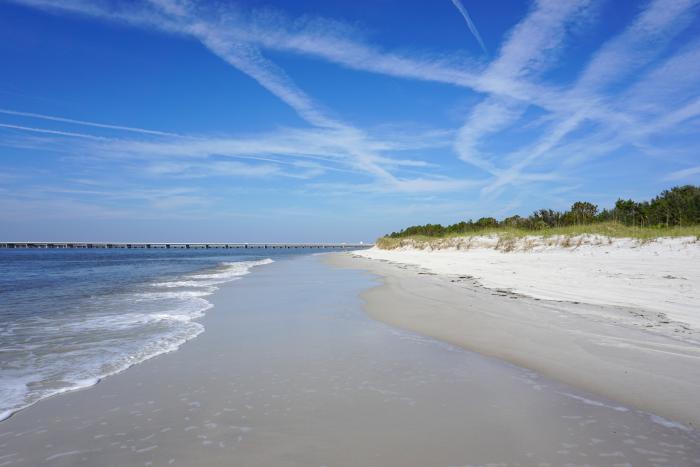
DEP ACQUIRES REMAINING ACRES WITHIN TIGER ISLAND/LITTLE TIGER ISLAND FLORIDA FOREVER PROJECT
DEP acquired the 565 remaining acres within the Tiger Island/Little Tiger Island Florida Forever project. This acquisition includes Little Tiger Island and a portion of Middle Island and completes the 1,463-acre project.
Adjacent to the Nassau River-St. Johns River Marshes and Fort Clinch Aquatic Preserves, the project connects a network of national and state preserves and parks that stretch from St. Andrews Sound in Georgia to the St. Johns River in Florida and protects tidal marsh ecosystems along the St. Marys and Amelia rivers.
“Under the leadership of Governor DeSantis, the state of Florida has become a national leader in resilience action,” said DEP Secretary Shawn Hamilton. “Hurricanes Ian and Nicole illustrate just how crucial this investment is and will continue to be. These identified projects announced today will ensure inland and coastal communities are prepared for the impacts of storm surge, hurricanes and flooding and allow us to continue our aggressive efforts to protect Florida’s natural resources and infrastructure.”
DEP ANNOUNCES CONTINUED HISTORIC INVESTMENTS IN RESILIENCE
DEPannounced the award of over $28 million to develop or update comprehensive vulnerability assessments. The 128 planning grants awardedwill result in 222 local government vulnerability assessments. At the conclusion of these assessments, all 67 counties in Florida will have completed a vulnerability assessment and be eligible for inclusion in future iterations of the Statewide Flooding and Sea Level Rise Resilience Plan, which proposes funding for the highest ranked resilience and adaptation projects across the state.
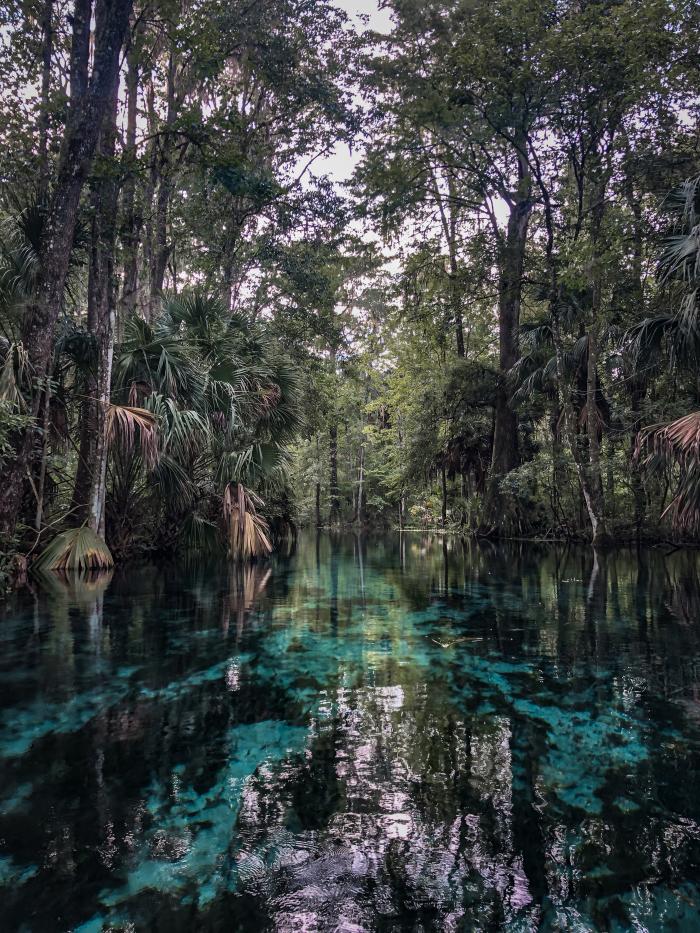
GOVERNOR DESANTIS AWARDS NEARLY $240 MILLION TO IMPROVE WATER QUALITY ACROSS THE STATE
Governor DeSantis awarded $240 million through the Wastewater Grant Program to support 36 wastewater infrastructure projects to reduce nutrients in Florida’s waterways. Awarded projects include advanced wastewater treatment upgrades and septic to sewer projects that will eliminate nearly 20,000 septic tanks.
DEP’s Wastewater Grant Program helps fund wastewater infrastructure projects that construct, upgrade, or expand wastewater treatment facilities to provide advanced waste treatment and projects to upgrade or convert traditional septic systems.
“Under Governor DeSantis’ leadership, Florida is tackling the state’s water quality issues head on,” said DEP Secretary Shawn Hamilton. “It’s through major funding commitments like this, paired with our talented and passionate staff and partners, that we can truly reduce nutrient pollution and continue to restore our natural resources.”
“Under the leadership of Governor DeSantis, the state of Florida has become a national leader in resilience action,” said DEP Secretary Shawn Hamilton. “Hurricanes Ian and Nicole illustrate just how crucial this investment is and will continue to be. This funding lays the critical foundation for the essential collaboration to successfully address the state’s most challenging resilience issues.”
GOVERNOR DESANTIS ANNOUNCES AWARD OF MORE THAN $275 MILLION THROUGH THE RESILIENT FLORIDA GRANT PROGRAM
Governor DeSantis announced the award of more than $275 million immediately available for 75 resilience projects using already-appropriated funding through the Resilient Florida program to help prepare coastal and inland communities for the adverse impacts of flooding and storm surge.
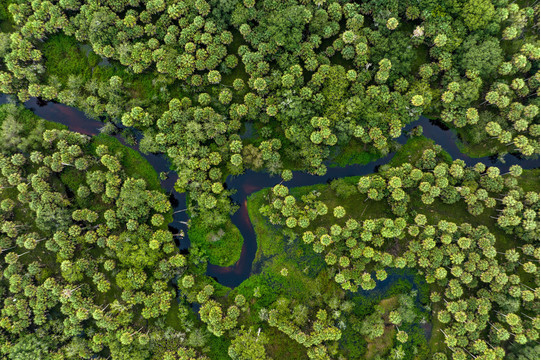
Photo by Carlton Ward Jr./Wildpath
DEP PROTECTS NEARLY 12,000 ACRES WITHIN THE PEACE RIVER WATERSHED
DEP finalized the purchase of an 11,958-acre conservation easement in DeSoto and Hardee counties within the Horse Creek Ranch Florida Forever project.
Previously approved for acquisition by Governor DeSantis and the Florida Cabinet, this property provides a buffer for Horse Creek, a tributary of the Peace River, and ensures the continued protection of the area’s drinking water supply. Protecting intact native wetlands in the Peace River watershed is crucial to the health of the Charlotte Harbor Estuary and the Gulf of Mexico.
In addition, the Southwest Florida Water Management District purchased a conservation easement over Carlton Horse Creek Ranch’s remaining acreage, which brings the total protected area to more than 16,000 acres and completes this Florida Forever project.
“Decades of human impacts have resulted in impaired water quality in the Indian River Lagoon, specifically from nutrients,” said DEPSecretary Shawn Hamilton. “As a result of the leadership of Governor DeSantis and unprecedented investments in water quality, the Department, in conjunction with project partners, is focusing on tackling the root cause of nutrient pollution.”
GOVERNOR DESANTIS ANNOUNCES NEARLY $20 MILLION FOR WATER QUALITY PROJECTS TO RESTORE THE INDIAN RIVER LAGOON
Governor DeSantis announced nearly $20 million to support water quality improvement projects along the Indian River Lagoon. These projects will help collect stormwater runoff and treat it to reduce the amount of pollutants and nutrients that enter the lagoon. These projects are in addition to the $255 million Florida is already investing to protect the lagoon, including targeting wastewater, septic to sewer, and other needed restoration projects.
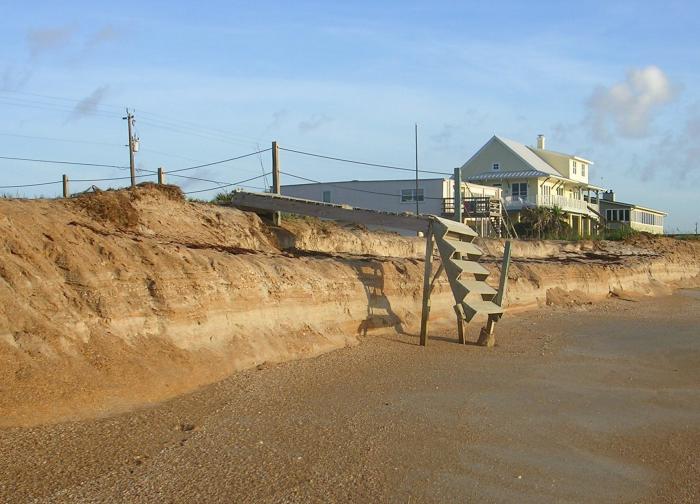
GOVERNOR DESANTIS ANNOUNCES AWARD OF $100 MILLION FOR BEACH RECOVERY FOLLOWING HURRICANES IAN AND NICOLE
Governor DeSantis awarded$100 million to support beach nourishment projects within 16 coastal counties impacted by Hurricane Ian or Hurricane Nicole.A wide, nourished beach system absorbs wave energy, protects upland areas from flooding, and mitigates erosion. A healthy beach provides a buffer between storm waves and landward areas, preventing destructive waves from reaching the dunes and upland developments.
“Beaches are vital not only to the environment and the state’s economy but are most importantly our first line of defense against storms,” saidDEP Secretary Shawn Hamilton. “I am thankful for the support and leadership of Governor DeSantis and the Florida Legislature to accelerate restoration and further protect these impacted communities from future storm events.”
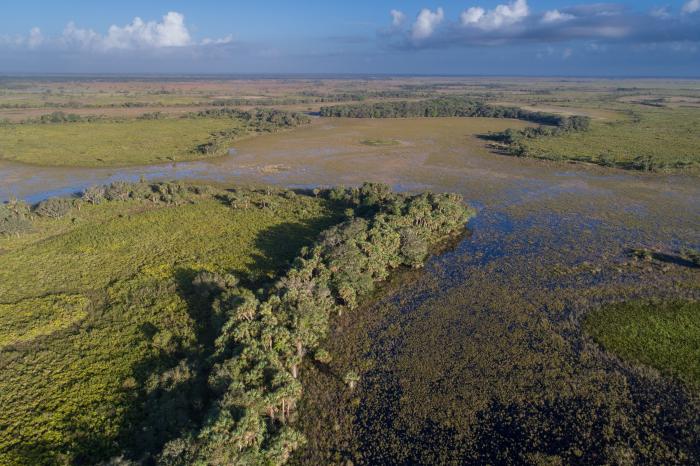
Photo by Carlton Ward/Wildpath
GOVERNOR DESANTIS AND THE FLORIDA CABINET INVEST OVER $17.7 MILLION TO CONSERVE 3,500 ACRES IN FLORIDA
Governor DeSantis and the Florida Cabinet approved the investment of more than $17.7 million to conserve more than 3,500 acres across the state. The five properties stretch from Nassau County south to Charlotte County and protect or buffer lands within the Florida Wildlife Corridor, a recently designated network of connected lands that is crucial for wildlife habitat. They also complete two Florida Forever projects.
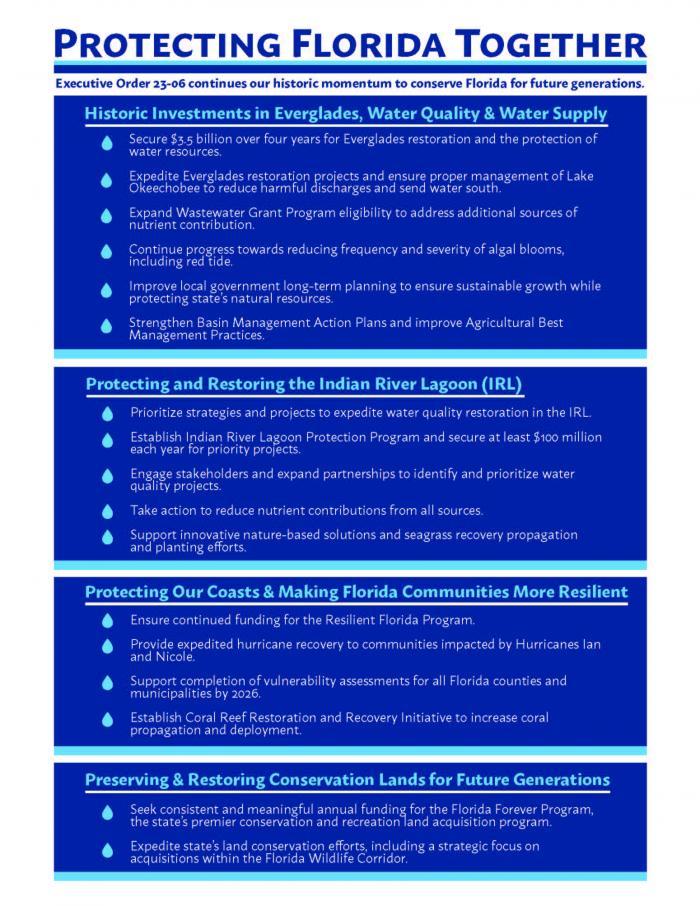
Governor Ron DeSantis Signs Historic Executive Order Continuing Commitment to Stewardship of Florida’s Natural Resources
Governor Ron DeSantis signed Executive Order 23-06 (Achieving Even More Now for Florida's Environment), to further advance the protection of Florida’s environment and water quality. The Executive Order directs strategic action with a focus on accountability, sound science, progress, and collaboration and includes a proposed $3.5 billion investment over four years for Everglades restoration and protection of our water resources, surpassing the historic investments of the past four years and making it the highest level of funding in Florida’s history.
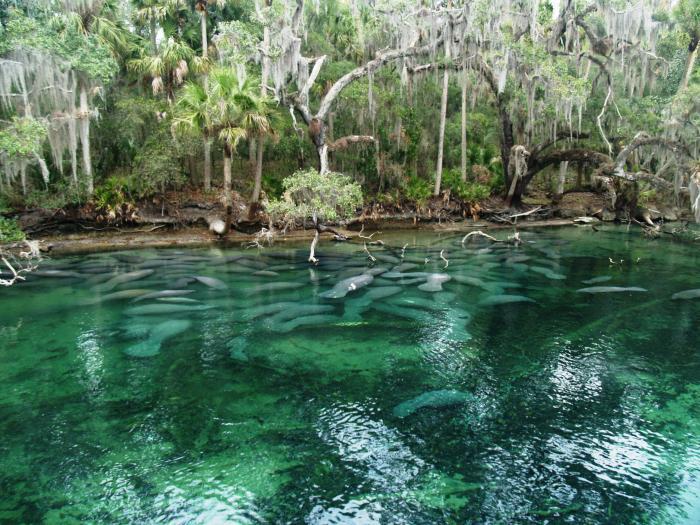
Governor DeSantis Announces Nearly $75 Million Awarded to Statewide Springs Restoration Projects
Governor Ron DeSantis announced nearly $75 million for 30 statewide springs restoration projects to aid the recovery of and provide additional protection for Florida’s springs. The Florida Department of Environmental Protection (DEP) and four Florida water management districts have identified a broad suite of projects that include land acquisition, septic to sewer conversion, and water quality improvement efforts intended to increase aquifer recharge, improve spring flow, and protect springs and their spring runs.
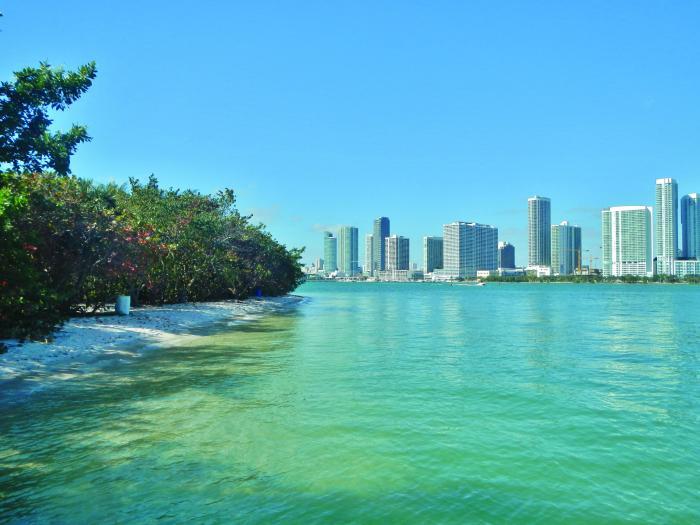
Governor DeSantis Awards Over $22 Million for Water Quality Projects to Benefit Biscayne Bay
Governor Ron DeSantis announced seven awards totaling $22.7 million to support water quality improvements and protection of Biscayne Bay. Projects funded through the Biscayne Bay Grant Program include septic to sewer conversions, stormwater management and wetland restoration in areas surrounding Biscayne Bay, Florida’s largest estuary with a direct connection to Florida’s Coral Reef. The Bay also serves as an important economic driver for the region as it contains the largest passenger port in the world and is an international sailing destination.
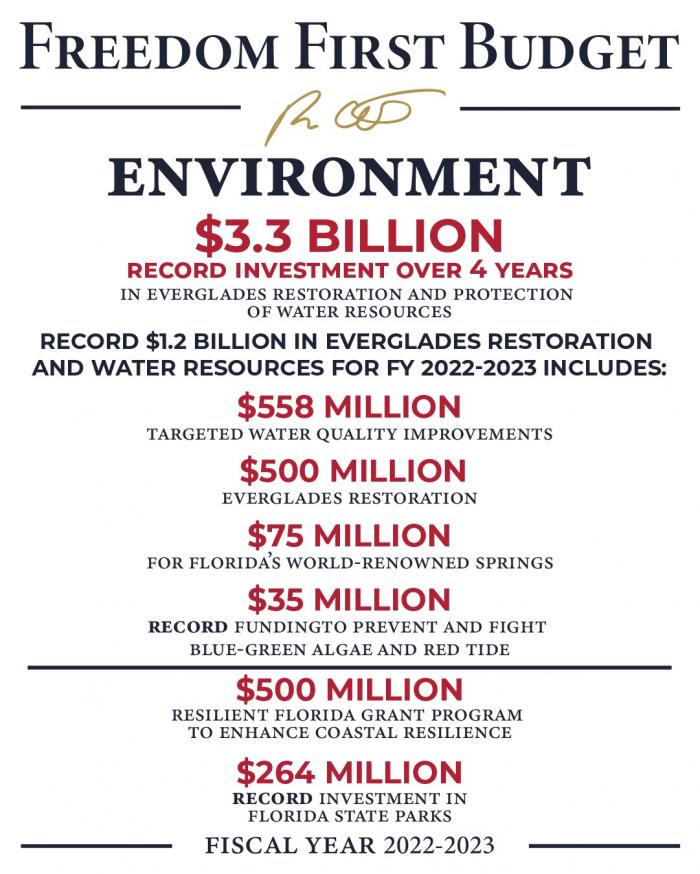
Freedom First Budget Surpasses Funding Goal
On June 2, 2022, Governor Ron DeSantis signed the Fiscal Year 2022-23 budget, surpassing his four-year goal for Everglades restoration and protection of water resources. This brings the four-year total to more than $3.3 billion, surpassing the goal of $2.5 billion and more than doubling the investment made in the previous four years.
"On his first full day in office, Governor DeSantis issued Executive Order 19-12, which laid out his bold vision to protect Florida’s environment. The FY 2022-23 environmental budget continues the Governor's commitment with historic levels of support for Everglades restoration, water quality protections, vital land acquisitions, and resiliency of inland and coastal communities," said DEP Secretary Shawn Hamilton. "With this funding, DEP and its partners will be able to continue our work to expedite Everglades restoration; implement clean water projects to reduce nutrients in our waterways; assist communities with water supply projects; combat blue-green algae and red tide; make our communities more resilient; and acquire vital lands essential to the tourism that drives Florida's economy and protection of our critical water resources."
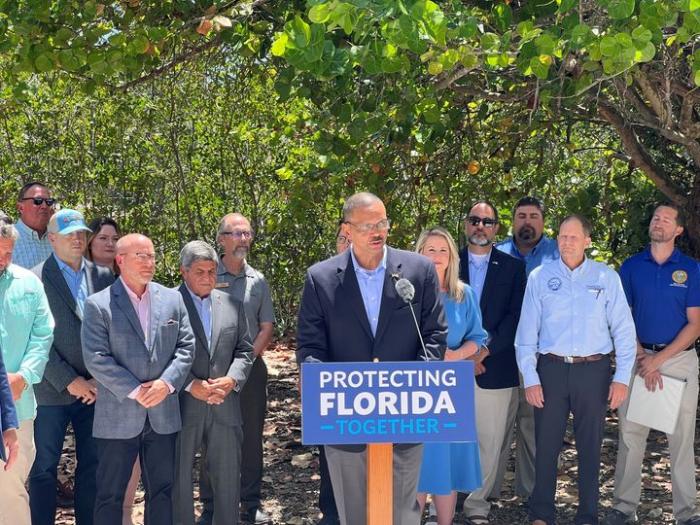
“Today is another example of the leadership of Governor DeSantis, the Florida Legislature, and local governments in action across our state to tackle resilience,” said DEP Secretary Shawn Hamilton. “These planning grants will provide critical information to better enhance and protect critical infrastructure from the impacts of sea level rise, flooding and storm events, ensuring the safety and resilience of Florida communities.”
Governor DeSantis Announces Award of Nearly $20 Million for 98 Projects
Governor Ron DeSantis and DEP Secretary Shawn Hamilton announced 98 new planning projects totaling nearly $20 million that will assist local governments with completing vulnerability and stormwater assessments in inland and coastal communities.
Vulnerability assessments are required to assess and identify critical infrastructure at risk of flooding from sea level rise, storm surge and rainfall events. The assessments assist local communities in prioritizing and developing implementation strategies and projects designed to reduce, alleviate or mitigate the effects of flooding.
Governor DeSantis also announced that DEP has opened the grants portal for Resilient Florida Planning Grants for Fiscal Year 2022-23. The portal will remain open until June 22, 2022.
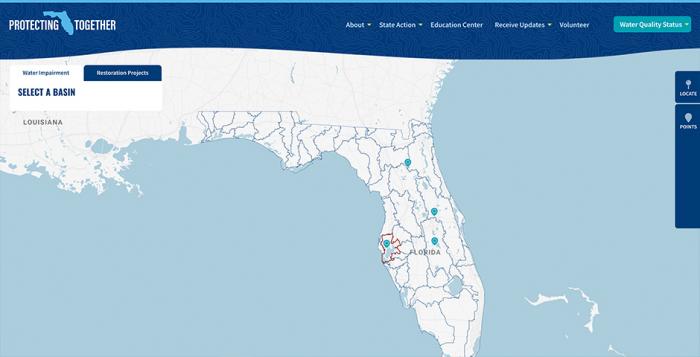
Protecting Florida Together Water Quality Data Map Announced 2022 Webby Winner
The water quality map on Protecting Florida Together was announced as the 2022 Webby Award winner for the category Websites and Mobile Sites, Government & Civil Innovation. The Webby Awards is the leading international award honoring excellence on the Internet since 1997.

Florida Water Reuse Week Scheduled
WateReuse Florida proclaimed “Florida Water Reuse Week” May 15 - 21, 2022. Reuse week is an opportunity to recognize and advocate for the many benefits of water recycling for Florida communities. The week will include virtual and in-person programs as well as new resources and information.
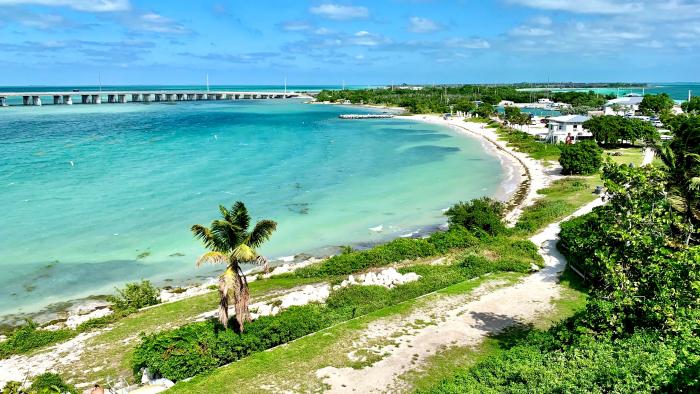
“Today’s record investment, as well as the projects included in the statewide plan for future funding, will strengthen our infrastructure to withstand the impacts of flooding and storm surge,” said Governor Ron DeSantis. “For the first time ever, Florida has strategic coordination of statewide efforts to protect our coastal and inland infrastructure, and the dedicated funding to support these projects. This announcement is just the beginning. My administration will continue to support our communities’ resilience efforts across the state.”
“Under Governor DeSantis’ bold vision and leadership, the state of Florida is leading the way on resilience so that our inland and coastal communities are better prepared and more prosperous,” said Chief Resilience Officer Dr. Wes Brooks. “Today’s announcement brings total investments from state-directed and local match funding to more than $1.2 billion for 189 priority projects through the Resilient Florida program and the Statewide Resilience Plan. Much of that funding will support good construction and engineering jobs in our communities, and these projects will also save billions of dollars in avoided flood and storm damages.”
Governor DeSantis Announces Award of More Than $404 Million for 113 Projects
Governor Ron DeSantis visited Pinellas and Miami-Dade counties to announce the award of grants totaling over $404 million for 113 environmental resilience projects across the state through the Resilient Florida Grant Program, which will help prepare coastal and inland communities for the adverse impacts of flooding and storm surge. This is in addition to the 76 projects totaling more than $270 million announced December 2021 as part of the Statewide Flooding Resilience Plan. The Governor was joined by House Speaker Chris Sprowls, Florida Department of Environmental Protection Secretary Shawn Hamilton, Chief Resilience Officer Dr. Wes Brooks and other stakeholders to make the announcement.
The projects awarded today will enhance Florida’s efforts to protect inland and coastal communities from storm damage spanning across 25 counties. Including the local match associated with these projects, today’s state and local investment for resilience totals more than $730 million.
Governor DeSantis Touts State's Commitment to America's Everglades
Governor Ron DeSantis was joined in Wellington, Florida, by U.S. Senator Marco Rubio, U.S. Congressman Brian Mast, U.S. Congressman Byron Donalds, Florida Department of Environmental Protection Secretary Shawn Hamilton, Florida Chief Resilience Officer Dr. Wes Brooks, the South Florida Water Management District and other stakeholders to highlight Florida’s progress in restoring America’s Everglades and to call on the Biden administration to allocate the funding necessary to timely advance the federal portion of the Everglades Agricultural Area Reservoir project. Additionally, Governor DeSantis requested the Biden administration include at least $725 million for Everglades restoration in the upcoming Fiscal Year 2022-23 budget request.
Everglades restoration is a 50/50 partnership between the state and federal government. Since Governor DeSantis took office, 43 Everglades restoration projects have broken ground, achieved a major milestone or finished construction. The EAA Reservoir Project is one of the most important Everglades restoration projects for reducing harmful discharges to the Caloosahatchee and St. Lucie estuaries and sending more clean water south to the Everglades. Governor DeSantis expedited this critical Everglades project on his second day in office with the signing of Executive Order 19-12. The Biden administration recently announced a $1.1 billion one-time investment for Everglades restoration, but the funding was dedicated to other projects that, while part of the important work to restore the Everglades, will not meaningfully reduce harmful discharges from Lake Okeechobee.
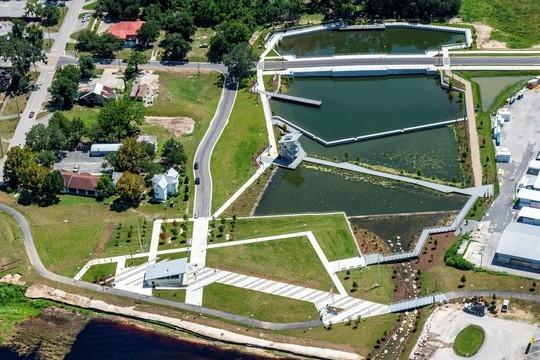
Photo of Victory Pointe Park in Clermont, Florida.
"I encourage our stakeholders to visit the new GSI website. This site complements our agency’s ongoing efforts to protect Florida’s water resources by providing case studies, technical guidance and information about funding offered by DEP for green stormwater infrastructure,” said DEP Deputy Secretary for Ecosystems Restoration Adam Blalock.
DEP Launches New Green Stormwater Infrastructure Website
The Florida Department of Environmental Protection’s Division of Water Restoration Assistance Nonpoint Source Management program announces the launch of the new green stormwater infrastructure (GSI) website. The site is a resource where communities can learn what GSI is, why it matters, how to get started, and how to implement projects that deliver environmental, social and economic benefits to communities.
The new website showcases green stormwater infrastructure success stories along with technical resources to assist in project planning. These resources will assist communities in determining which stormwater best management practices are most appropriate for an area, evaluating costs and maintenance requirements, and estimating nutrient reduction effectiveness.
“Florida continues to lead the nation in population growth and job growth. Recognizing that Florida’s economy is inextricably linked to its unique environment, Governor DeSantis continues to champion historic investments in Florida's environment and water quality to ensure the delicate balance of environmental protection and a heathy economy is maintained," said DEP Secretary Shawn Hamilton. “The Freedom First budget continues that commitment by allocating more than $2.2 billion for key environmental priorities, including dedicating $972 million to Everglades and water quality protection. With this historic funding, DEP and partners will be able to continue our work to expedite Everglades restoration through sound science and project collaboration; implement clean water projects to reduce nutrients in our waterways; assist communities with water supply projects to meet Florida’s future water needs; combat blue-green algae and red tide that have harmful environmental and economic impacts on our communities; and make our communities more resilient through technical assistance and funding to address flooding, erosion and ecosystem changes."
Statement by DEP Secretary Hamilton on Governor DeSantis' Freedom First Budget
Florida Department of Environmental Protection Secretary Shawn Hamilton issues the following statement regarding Governor DeSantis' submittal of his proposed Freedom First budget for Fiscal Year 2022-23 to the Florida Legislature. Governor Desantis' Freedom First Budget reinforces commitment to everglades restoration, water quality protections, vital land acquisitions and resiliency of coastal communities.
“We have done a lot to support Florida water resources and we know infrastructure for clean and strong waterways is important,” said Governor Ron DeSantis. “We also want to fortify infrastructure to make communities across Florida more resilient. We are a low-lying state, a storm prone state, and a flood prone state. In the last legislative session, we worked with Speaker Sprowls, President Simpson, and the rest of the legislature to address this issue in a way that will protect Florida communities and protect our economic livelihood. I am happy to propose 76 projects totaling over $270 million across the state of Florida, which will be matched by local investments as part of a three-year plan to address community identified vulnerabilities.”
“As a low-lying state that is surrounded by water on three sides, Florida is particularly vulnerable to the risks of flooding; for too long, we’ve been reactionary in our response,” said House Speaker Chris Sprowls. “With our ‘Always Ready’ legislation signed into law and the first preliminary plan delivered today, Florida is going to be strategic, proactive and a leader among all other states in our response. I am pleased we were able to reach this first milestone and commend the Governor for his partnership and good work on this plan.”
“I’m grateful for another critical step forward in resilience efforts as a consequence of Governor DeSantis and the Florida legislature’s commitment,” said DEP Secretary Shawn Hamilton. “This plan fosters the collaboration required to properly solve the state’s most difficult resilience concerns. It will allow us to continue our aggressive efforts to protect Florida’s natural resources, as well as the recreational and tourism-based economies of our coastal communities.”
Governor DeSantis Announces First Ever Statewide Flooding Resilience Plan
Governor Ron DeSantis was joined by Florida Department of Environmental Protection (DEP) Secretary Shawn Hamilton, Chief Resilience Officer Dr. Wes Brooks, and other stakeholders to announce another milestone in Florida’s efforts to protect Florida’s coastal and inland communities with the state’s first ever Statewide Flooding Resilience Plan.
The three-year Flooding and Sea Level Rise Resilience Plan proposes 76 projects totaling over $270 million across the state, subject to appropriation. These projects will enhance Florida’s efforts to protect inland waterways, coastlines, shores, and coral reefs, which are invaluable natural defenses against sea-level rise and flooding. The plan is part of Senate Bill 1954, signed by Governor DeSantis earlier this year, which ensures a coordinated approach to Florida’s coastal and inland resilience and provides a structure for resilience that follows the best available science and data while enhancing efforts to protect inland and coastal resources that act as natural defenses against sea-level rise.
DEP accepted applications through their online portal through Sept. 1, 2021. These applications were carefully evaluated for eligibility by the department under the criteria established in Senate Bill 1954.
“Thank you, Governor DeSantis, for recommending $660 million for America’s Everglades — the largest investment in the history of the program,” said Eric Eikenberg, Chief Executive Officer, Everglades Foundation. “Because of Governor DeSantis’ leadership, Florida’s one-of-a-kind environment and water resources will have the funding to be protected and restored. At the start of his term, Governor DeSantis pledged to seek at least $2.5 billion over four years in Everglades restoration and water resources in the state, and with this budget, he has delivered. This continued investment in America’s Everglades will not only help build critical water infrastructure that will advance the restoration of a national treasure, but it will create and save jobs, boost our state’s tourism-based economy, and yield tangible benefits for Floridians."
“The Governor’s FY 2022-23 budget represents a promise kept for protecting Florida’s water resources and bold action on funding solutions to flooding in Florida,” said Noah Valenstein, former DEP Secretary and Senior Advisor for the American Flood Coalition. “Florida has serious flooding challenges to tackle but has a Governor who is serious about delivering solutions that can lead the nation on resilience funding and policy. By working with communities, the Resilient Florida Program will capitalize on environmental investments to reduce flooding and protect Florida’s water resources. The Governor and Secretary Hamilton have shown that Florida’s environment and economy are intertwined and that both can be protected by working together.”
Governor DeSantis Announces Budget Proposals for Everglades Restoration, Protection of Water Resources and Resilient Florida Program
Governor Ron DeSantis visited Naples and Miami to announce his environmental budget proposals, including over $960 million for Everglades restoration and the protection of water resources and more than $550 million to continue to support efforts to ensure that state and local communities are prepared to deal with the impacts of sea level rise, intensified storms and flooding.
“These awards are going to make a big difference for our world-renowned springs and water quality all throughout the state of Florida,” said Governor Ron DeSantis. “Florida’s water resources are what our economy runs on - they are an economic driver, but even apart from that, our environment is really integral to what these communities are all about. We're blessed to have it and we have a responsibility to leave it better than we found it.
“Today, we are taking another step forward for the protection of our state’s natural resources,” said DEP Secretary Shawn Hamilton. “This funding will support 103 important projects to construct, upgrade, or expand wastewater treatment facilities to provide advanced waste treatment, upgrade or convert traditional septic systems, and acquire land that will restore and protect our springs and other waterways.
“I want to thank Governor DeSantis for his leadership and commitment to implementing sound, science-based solutions to current and future environmental challenges,” said Florida Chief Science Officer Dr. Mark Rains. “Today’s announcement is another example of this vision in action. These projects will result in demonstrable water quality benefits for our springs and waterbodies throughout the state.”
Governor DeSantis Announces More Than $481 Million to Improve Water Quality
Governor DeSantis was joined by Florida Department of Environmental Protection Secretary Shawn Hamilton, and Chief Science Officer Dr. Mark Rains to announce the awards for 103 wastewater and springs projects totaling $481 million. The projects awarded will improve water quality in waterbodies across Florida, reducing total nitrogen loading by a combined more than 700,000 pounds per year.
The more than $481 million awarded today was made available through three grant programs administered by DEP – the Wastewater Grant Program, Springs restoration grants and the Small Community Wastewater Grant Program.
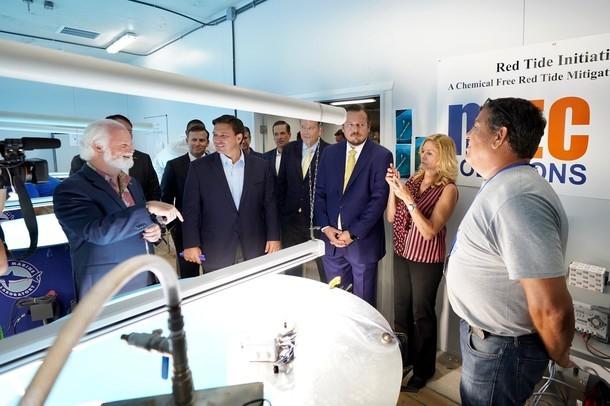
“The state of Florida has again demonstrated today that it is a national leader in the utilization of science and engineering to decrease the negative impacts of harmful algal blooms on our environment, economy and quality of life,” said Dr. Michael P. Crosby, President and CEO of Mote Marine Laboratory. “The best and brightest minds in research and technology development are now able to utilize this incredible facility because Governor DeSantis and our state Legislature fully embraced a vision for pushing the frontiers of science forward to benefit society. Mote is honored and proud to be leading this initiative in collaboration with FWC along with over 20 partnering institutions from around the world.”
Governor DeSantis Celebrates Ribbon-Cutting for Florida Red Tide Mitigation and Technology Development Facility
Governor DeSantis was joined by leaders in the state’s efforts to combat red tide in celebrating the ribbon-cutting of the Florida Red Tide Mitigation and Technology Development Facility at Mote Marine Laboratory. This cutting-edge experimental facility at Mote Aquaculture Research Park in Sarasota will allow scientists to test compounds and technologies prior to pilot field implementation.
“The concept of mitigating the effects of red tide is certainly a complicated ecological issue,” said Eric Sutton, Executive Director of the Florida Fish and Wildlife Conservation Commission (FWC). “Through the support of Governor Ron DeSantis and the Legislature, we now have the world’s foremost scientific experts collaborating to determine the possibilities of mitigation.”
“Science, innovation and partnership are all critical components of our efforts to combat harmful algal blooms,” said Shawn Hamilton, Interim Secretary of the Florida Department of Environmental Protection (DEP). “Making water quality in this state one of his top priorities, the Governor has secured the resources to ensure science remains at the forefront of environmental policy and management. DEP looks forward to continued collaboration between state and local partners, as well as research institutes like Mote.”
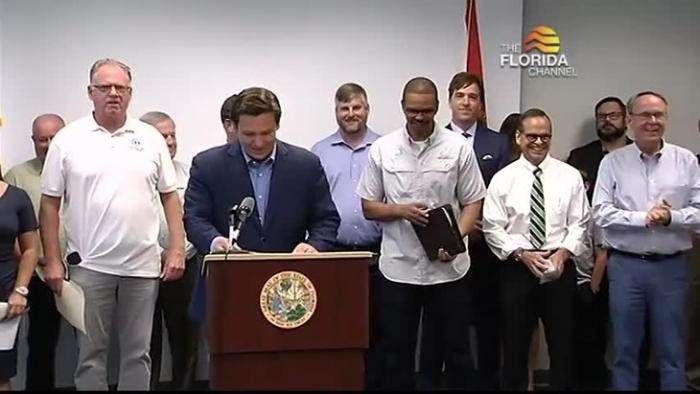
“DEP and FWC continue to prioritize frequent, direct coordination with the local governments that are on the front lines of this response effort,” said DEP Interim Secretary Shawn Hamilton. “Governor DeSantis has made it clear that the state is committed to ensuring impacted communities have the support they need today and moving forward. DEP will maintain its presence in the region to ensure continued collaboration and the most comprehensive event response.”
“At the direction of Governor Ron DeSantis, DEP Interim Secretary Shawn Hamilton and I have been meeting with local community leaders, legislators and stakeholders, deploying all collective resources during the ongoing red tide event in the greater Tampa Bay area,” said FWC Executive Director Eric Sutton. “Having spent much of my life in Southwest Florida, I know the impacts these blooms can have on our communities and that working together is critical.”
Governor DeSantis Surveys Impacts and Provides Updates on State's Response to Red Tide
Governor Ron DeSantis joined the Florida Department of Environmental Protection (DEP) and the Florida Fish and Wildlife Conservation Commission (FWC) to survey the impacts of the red tide bloom affecting Southwest Florida and the Tampa Bay area. Governor DeSantis also provided an update on state response efforts, which include funding to cover cleanup costs, increased water quality monitoring and use of innovative technology to continuously image water samples.
The state has answered the Governor’s call for an all-hands-on-deck approach in response to the red tide bloom impacting the area.
- DEP is providing financial assistance to local governments to assist in cleanup efforts. To date, DEP has committed $2.1 million to Pinellas County to cover cleanup costs incurred for both the county and the city of St. Petersburg. DEP will continue to work with all affected counties in need of assistance.
- DEP and FWC have significantly increased monitoring and sampling efforts in Tampa Bay and the surrounding waters. When comparing June 2020 and June 2021, the number of samples processed in Tampa Bay has increased by 165%.
- FWC has deployed a sampling robot - an innovative technology that provides unprecedented information about how many red tide cells are present at a given time and the behavior of those cells. The robot collects samples every 20 minutes.
- The Florida Department of Health and county health departments have been working with local governments and partners to communicate health information to impacted communities, including placing signage in affected areas and distributing advisory community outreach through various mediums.
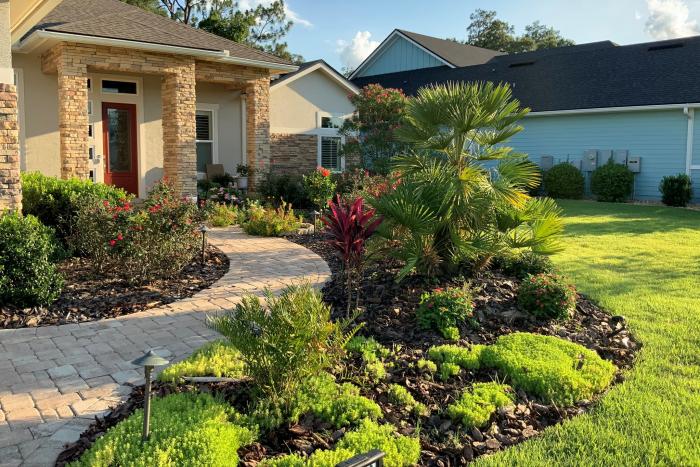
Season Two of the Flip My Florida Yard TV Series Seeking Interested Homeowners
In partnership with the Florida Department of Environmental Protection and the University of Florida Institute of Food and Agricultural Sciences, the Flip My Florida Yard television series is seeking nine Florida homeowners who want help “flipping” their yard into a Florida-Friendly landscape.
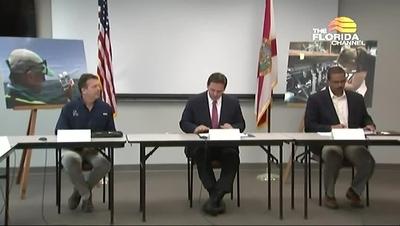
“Governor DeSantis has made it clear that the water quality in this state is a top priority,” said DEP Interim Secretary Shawn Hamilton. “Continued strategic, science-based, immediate actions will allow us to make meaningful progress in our efforts to combat red tide. As a result of the Governor’s leadership, the state has the support and resources to further partnerships, research and mitigation, which will remain critical to our success in addressing the impacts of red tide on our environment and communities.”
“Governor DeSantis has been a champion for conservation and the environment. Today’s roundtable and his actions are evidence of his commitment to ensuring Florida’s natural resources will be conserved for future generations,” said FWC Executive Director Eric Sutton. “In the recent budget, the $4.8 million to continue supporting the Center for Red Tide Research was critical to the ongoing protection of our water resources. With the Governor’s support, we’ve stepped up community science and volunteer networks, invested in automated monitoring technology and improved our analytical capabilities.”
Governor DeSantis Holds Roundtable to Discuss Florida's to Combat Red Tide
Governor Ron DeSantis held a roundtable with leading scientists, researchers and business owners to discuss Florida’s commitment to combating red tide.
Upon taking office, Governor DeSantis outlined a bold approach to tackle Florida’s critical water issues in Executive Order 19-12 (Achieving More Now for Florida’s Environment), including the reactivation of the long-dormant Red Tide Task Force. Under the Governor’s direction, the task orce adopted an initial short-term, top-priority focus on key issues associated with red tide, including public health, communications, management and response, and research. The task force continues to meet at least quarterly to further the state’s efforts to combat red tide.
Since 2019, the state has dedicated more than $14.5 million to the Center for Red Tide Research at the Florida Fish and Wildlife Conservation Commission (FWC), created in 2019 at Governor DeSantis’ request. Additionally, in his first legislative session, Governor DeSantis signed into law Senate Bill 1552, which established the Florida Red Tide Mitigation and Technology Development Initiative, a partnership between FWC and Mote Marine Laboratory to develop technologies and approaches to control and mitigate red tide and its impacts.
Senate Bill 1552 provided a $3 million annual appropriation to the initiative for six years, totaling $18 million.
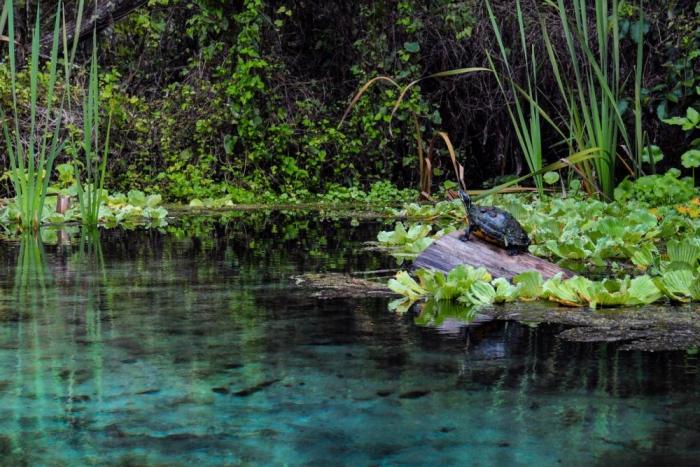
Photo credit: Jennifer Steffens, Silver Springs State Park
DEP Launches Online Grant Portal For Fiscal Year 2021-22
Governor Ron DeSantis signed the Fiscal Year 2021-22 state of Florida budget, making this the largest environmental budget in the state’s history. To execute this unprecedented investment, DEP is seeking project proposals for FY 2021-22 that will bolster existing efforts to protect and restore Florida’s ecosystems, including wastewater projects, innovative technology projects and targeted water quality improvements in Biscayne Bay, the Springs Coast watershed and the Peace River basin.
“Thanks to the Governor’s bold vision and the continued support of the Legislature, Florida's environmental priorities have remained strong and our natural resources are better protected today than they have ever been,” said DEP Secretary Noah Valenstein. “The critical funding allocated in this year’s budget will enhance the state’s steadfast dedication to improve the health of Florida’s environment and ensure our natural resources are a legacy for future generations to enjoy.”
Fiscal Year 2021-22 Budget is a Win for Florida's Environment
Governor Ron DeSantis signed the Fiscal Year 2021-22 state of Florida budget, which continues support of his key environmental initiatives and programs. The unprecedented investment in Florida’s environment will enable the Florida Department of Environmental Protection (DEP) and its partners to continue to:
- Expedite Everglades restoration through sound science and project collaboration putting the state on track to complete key projects over the next two years, including C-44 and C-43.
- Achieve significant water quality improvements throughout the state by implementing targeted water quality projects, including septic conversions and upgrades, and wastewater and stormwater improvements.
- Protect and restore Florida’s springs.
- Support Florida’s growing need for water supply through conservation and reuse projects.
- Protect and preserve Florida’s unique natural resources through land acquisitions, including a focus on wildlife corridors.
- Prepare our communities for the effects of climate change through technical assistance and funding to address flooding, erosion and ecosystem changes.
Governor DeSantis sends letter to Army Corps to emphasize importance of LOSOM
“Today, Governor Ron DeSantis sent a letter to the Army Corps emphasizing the importance of mutual federal-state dedication to this success as the Lake O System Operating Manual is underway. In order to protect estuaries & surrounding waterbodies while sending more water south through the Everglades, we must Protect Florida Together.” – Secretary Noah Valenstein
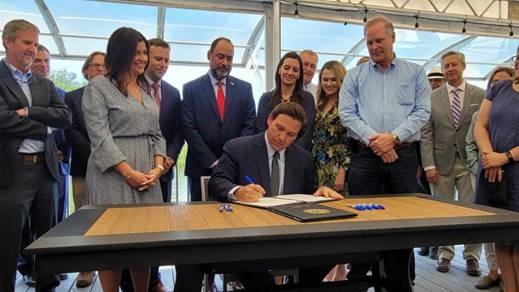
(Governor DeSantis signing the historic legislation)
“Since day one, the resiliency of our state has been a top priority for my administration,” said Governor Ron DeSantis. “This legislation will allow us to build on historic investments and progress by ensuring communities have the resources they need for resilience planning and project implementation as well as creating a framework for a cohesive, coordinated approach to address the impacts of sea level rise, intensified storms, and localized flooding.”
“We are making pivotal strides in resilience efforts as a result of the support of Governor DeSantis and the Florida legislature,” said DEP Secretary Noah Valenstein. “This legislation will create the essential collaboration to successfully address the state’s most challenging resiliency issues.”
Governor DeSantis Signs Bill to Further Strengthen Florida's Resiliency Efforts
Governor Ron DeSantis signed into law Senate Bill 1954. This comprehensive legislation will ensure a coordinated approach to Florida’s coastal and inland resiliency. The new program will enhance our efforts to protect our inland waterways, coastlines, shores and coral reefs, which serve as invaluable natural defenses against sea level rise.
The legislation will yield the largest investment in Florida’s history to prepare communities for the impacts of climate change – including sea level rise, intensified storms and flooding. This historic funding includes:
- $100 million in annual funding for the Resilient Florida Program, which will provide grants to local communities for resilience planning and projects.
- $29 million for establishment and planning efforts of the Resilient Florida Grant Program.
- $12.5 million for the Resilient Coastlines Initiative for resilience projects and coral reef protection.
- $500 million in federal stimulus funding for implementation of statewide resilience projects through the Statewide Flooding and Sea Level Rise Resilience Plan.
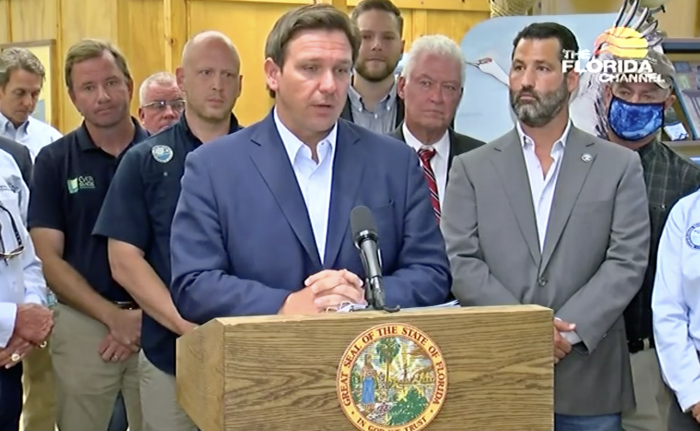
“Under the leadership of Governor DeSantis, the state has made great strides in advancing Everglades restoration projects that will restore the natural flow of clean water through the Everglades and send more water south to where it’s needed most. However, it is also vital that the Corps works in concert with the state of Florida to ensure Lake Okeechobee water levels are managed in a manner that puts us in the best position to avoid harmful summertime discharges to the northern estuaries,” said DEP Secretary Noah Valenstein.
Governor DeSantis Urges Army Corps to Reduce Harmful Discharges
Governor Ron DeSantis was joined by Florida Department of Environmental Protection Secretary Noah Valenstein and the South Florida Water Management District Board of Directors on a visit to Lake Okeechobee and the Caloosahatchee and St. Lucie rivers to observe current conditions. This visit comes as the U.S. Army Corps of Engineers works to finalize a new water control manual, the Lake Okeechobee System Operating Manual, for Lake Okeechobee.
The Governor urged the Corps to improve lake management to make more beneficial releases and send more water south during Florida’s dry season and to allow for flexibility to avoid harmful discharges in Florida’s northern estuaries. Reducing harmful discharges to the Caloosahatchee and St. Lucie rivers is critical for water quality in these vital ecosystems. Additionally, Governor DeSantis joined Florida’s bi-partisan congressional delegation in calling on the Biden administration to invest $725 million for South Florida Ecosystem Restoration to ensure critical Everglades restoration projects are completed as expeditiously as possible.
“Under the leadership of Governor DeSantis, DEP and the South Florida Water Management District have expedited the state’s portion of the EAA Reservoir project, beginning construction 12 months ahead of schedule,” said DEP Secretary Noah Valenstein. “The signing of the Project Partnership Agreement today is an important step that will enable the Corps to initiate construction of the federal portion of this project. I challenge the Corps to match the state’s momentum and sense of urgency on this critical project that will significantly reduce harmful discharges to the northern estuaries and send more water south for the benefit of the Everglades ecosystem and the people of Florida.”
Governor DeSantis Announces Major Milestone to Advance EAA Reservoir Project
Governor Ron DeSantis was joined by Florida Department of Environmental Protection Secretary Noah Valenstein and the South Florida Water Management District to announce significant progress on the Everglades Agricultural Area Reservoir Project.
The South Florida Water Management District Governing Board unanimously approved an agreement with the U.S. Army Corps of Engineers this morning that keeps the Corps on track to begin federal construction on the reservoir component this year. In April 2020, Governor DeSantis announced that the South Florida Water Management District began construction on the state of Florida’s component of the project, the stormwater treatment area, 12 months ahead of schedule.
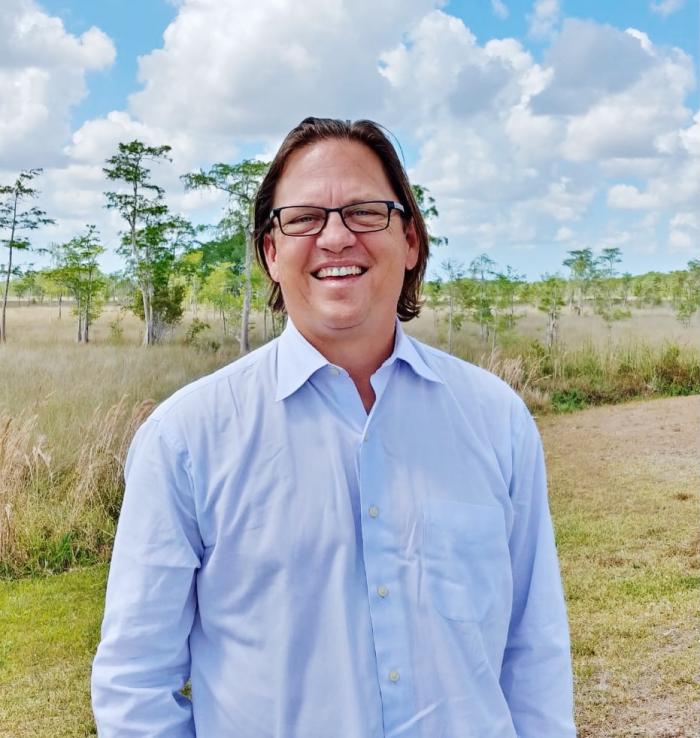
Dr. Rains currently serves as a professor, and chair and director of the School of Geosciences at the University of South Florida. He earned his bachelor’s degree in Ecology, Behavior and Evolution from the University of California at San Diego, his master’s degree in Forest Resources from the University of Washington and his Ph.D. in Hydrologic Sciences from the University of California at Davis. Dr. Rains is also a certified professional wetland scientist with years of experience in both the public and private sectors in Florida, Alaska and California.
Dr. Mark Rains Appointed as Florida's Next Chief Science Officer
Governor Ron DeSantis announced the appointment of Dr. Mark Rains as the state of Florida's next Chief Science Officer (CSO).
This position focuses on leading statewide strategies to address priority environmental issues statewide, and works to ensure that science is at the forefront of environmental protection and policy. With vast expertise engaging across sectors, Dr. Rains is dedicated to working with stakeholders to ensure common values are implemented into science-based policy decisions.
“It has been an honor to serve as Florida's first Chief Science Officer and an exceptionally rewarding experience. We have accomplished a great deal during the last two years and I feel privileged to have been part of an extremely talented team of professionals who are committed to the protection of Florida’s environment and its rich array of natural resources. Under the leadership of Governor DeSantis and Secretary Valenstein, I am confident that the forward momentum will continue." said Dr. Thomas Frazer, Dean and Professor at University of South Florida and Former Chief Science Officer.
View the press release below to read what else environmental leaders and stakeholders are saying about this new appointment and the important role of scientific expertise in Florida's environmental policy and protection.

“From the day he took office, the Governor has made it clear that achieving more for Florida’s environment is a top priority. He cemented that commitment with clear direction and decisive action outlined in Executive Order 19-12,” said Florida Department of Environmental Protection Secretary Noah Valenstein. “Since that time, an environmental movement has taken shape in Florida allowing us to lead the nation and resulting in unprecedented protections of Florida’s water quality.”
Governor DeSantis and DEP Celebrate Anniversary of Landmark Executive Order
Governor Ron DeSantis and the Florida Department of Environmental Protection celebrate the two year anniversary of Executive Order 19-12. Governor DeSantis signed this landmark Executive Order less than 48 hours after being sworn into office, outlining his bold vision for Florida’s environment.
The Executive Order directs strategic action with a focus on accountability, transparency and collaboration, including a proposed $2.5 billion investment in Everglades restoration and protection of water resources over four years.
"A clean and abundant supply of water is inextricably linked to our future prosperity and economic well-being,” said Governor Ron DeSantis. “This executive order laid the foundation for immediate action and represented a fundamental change in environmental policy for our state. I am proud of our accomplishments to date, our work has only just begun.”
"2020 has arguably been one of the most challenging years on record, and I am proud of the dedication and perseverance of DEP in protecting, conserving and managing Florida’s natural resources," Governor Ron DeSantis said. "When I took office two years ago, I laid out a plan addressing the protection of Florida's environment, and despite the COVID-19 pandemic, we have not skipped a beat. From increased enforcement, to securing critical land acquisitions, to expanding our state’s water monitoring networks, Floridians can rest assured knowing we continue to prioritize the environmental and economic well-being of our great state.”
"Thanks to the strong leadership of Governor DeSantis in 2020, DEP and our partners have expedited critical Everglades restoration projects, employed sound science to protect and restore our waterways, funded infrastructure projects to improve our state’s coastal resiliency, acquired lands through Florida Forever to safeguard Florida’s critical water supply and provided resource-based recreation to residents and visitors at a time when we needed it most," DEP Secretary Noah Valenstein said. "These accomplishments are just a few of the efforts our agency pursues every day. We take pride in our agency’s quick response to communities and public lands in the wake of damaging storms and in our long-term environmental programs to meet the needs of our unique and diverse state."
DEP Secretary Valenstein Highlights Governor DeSantis’ Continued Historic Environmental Achievements
From the day he took office, Governor Ron DeSantis made it clear that achieving more for Florida’s environment would be a top priority. Since that time, an environmental movement has taken shape in Florida resulting in unprecedented protections of our water, air and land. During 2020, under Governor DeSantis' leadership and with the support of the Florida Legislature, the Florida Department of Environmental Protection has taken aggressive steps to effectively address environmental issues at the source, while also responding to COVID-19.
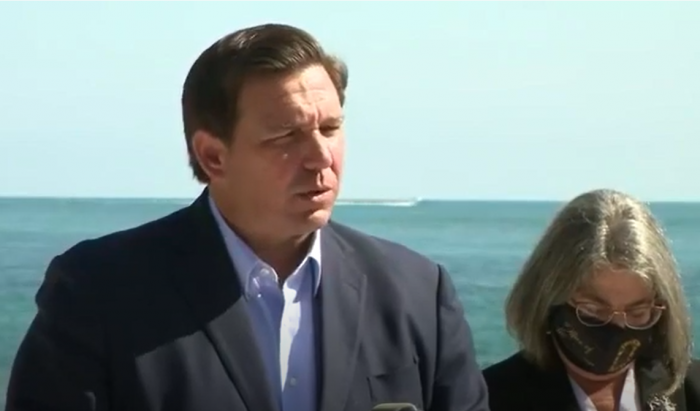
On Dec. 21, 2020, Governor Ron DeSantis announced a $20 million investment into the protection and preservation of Biscayne Bay, a joint funding initiative between the State of Florida and Miami-Dade County. The Governor was joined at the announcement by Miami-Dade County Mayor Daniella Levine Cava and Florida Department of Environmental Protection Secretary Noah Valenstein. The press conference was held in Key Biscayne, Florida.
Governor DeSantis Announces $20 Million for Protection and Preservation of Biscayne Bay
Governor Ron DeSantis announced a $20 million investment into the protection and preservation of Biscayne Bay, a joint funding initiative between the state of Florida and Miami-Dade County. The Governor was joined at the announcement by Miami-Dade County Mayor Daniella Levine Cava and Florida Department of Environmental Protection Secretary Noah Valenstein.
The state of Florida and Miami-Dade County will each invest $10 million, for a total of $20 million, for important infrastructure updates and new technology to help predict and prevent sanitary sewer overflows into the bay.
In the coming weeks, the state and county will work collaboratively to identify and pursue potential projects. Miami-Dade County has already identified six projects for $5 million, $2.5 million of which the state will cover.
“Florida continues to be a pioneer of environmental protection. This is a historic moment for our agency and our state,” said DEP Secretary Noah Valenstein. “We appreciate EPA’s stringent public review and approval of DEP’s assumption of this program. Our waters and wetlands are critical to our economy and way of life in Florida. As such, it is important for the state to take the lead in their protection. We are pleased that with the assumption, Florida scientists and permitters will now be accountable for state and federal wetlands permits. DEP staff know the state’s resources best and have the expertise to ensure their protection.”
State assumption utilizes the local expertise of DEP’s more than 200 environmental experts to further protect Florida’s diverse and unique natural resources. These capable team members are already responsible for managing Environmental Resource Permitting standards and will bring the same level of dedication to implementing the State 404 program.
DEP Receives EPA Approval for Oversight of Federal Wetlands Program
Florida Department of Environmental Protection (DEP) announced that after many years of thoughtful deliberation and preparation, the U.S. Environmental Protection Agency (EPA) has granted the state assumption of the 404 program (the federal permitting program to regulate the discharge of dredged or fill material into wetlands and other waters of the United States). In 2018, the Florida Legislature passed a bill that authorized Florida to kickstart the state assumption process. After a thorough federal and public review period, coupled with thorough internal preparation, DEP has been approved to adopt the federal 404 program and enhance the protection of Florida's wetlands.
Many of Florida’s restoration efforts, such as Everglades projects, have been delayed by the federal permitting program. Florida is known for overseeing the largest wetland restoration project in the world, as well as many other environmental projects. Assumption of this program allows DEP to harness state resources to more quickly permit these key projects.
State 404 assumption will localize and strengthen DEP’s environmental protection efforts, streamline permitting procedures and eliminate the duplicative reviews that halt progress on both public works and environmental projects. The majority of review requirements overlap between programs and integrating these processes at the state level will provide greater certainty to the regulated community and conserve the time and resources of both applicant and regulator.

Secretary Valenstein and Chris Peterson, St. Johns River Water Management District Governing Board Member, head out into Florida Bay to see first-hand the importance of Everglades restoration to the health of all water bodies in South Florida.The visit to Florida Bay showcased a greater understanding of the ecological significance of this water body and further illustrated the link between the Everglades and South Florida’s water quality. Immersed in Florida’s native habitat, participants visited the Shark River to see the largest mangroves in the state and fished for snook and redfish in abundant seagrass meadows.
“It’s a privilege to experience Florida at its wildest,” said Secretary Valenstein. “The real Florida lives on in the Everglades and within Florida Bay. The efforts of Governor DeSantis, DEP, the SFWMD, the federal government and our local partners are invaluable to the continued protection of these unique habitats. Florida's water resources are the driving force of our economy, environment and way of life as Floridians. A natural flow of clean, fresh water south through the Everglades will ensure these unique ecosystems are preserved for generations to come.”
SFWMD Governing Board Chairman, DEP Secretary and Environmental Leaders Visit Florida Bay to Discuss Everglades Restoration
Under the leadership of Governor DeSantis, the Florida Department of Environmental Protection has prioritized the preservation of Florida’s natural landscapes, enabling native ecosystems and the species they harbor to thrive. These historic and ongoing efforts are especially evident in the restoration and protection of America’s Everglades. Together with partners at the federal and local level, the state of Florida is spearheading one of the largest environmental restoration projects in the world by revitalizing America’s Everglades.
Federal funding for Everglades restoration set record levels through $235 million appropriated in 2020. Combined with $780 million in state funding allocated over the past two years, the total funding for Everglades restoration exceeds half a billion dollars per year. In addition to the Everglades restoration funding, Governor DeSantis has provided over $520 million in water quality investments throughout Florida over the past two years. The Everglades and the ecosystems it supports are international treasures, and the unprecedented financial commitments of the state and federal governments to protect these resources are monumental.
Highlighting the importance of these efforts, on Nov. 19, DEP Secretary Noah Valenstein, South Florida Water Management District Governing Board Chairman Chauncey Goss, along with Captains for Clean Water co-founders Captain Daniel Andrews and Captain Chris Wittman visited the critical ecosystem of Florida Bay - a shallow, sub-tropical estuary nestled between the coastal wetlands of the Southern Everglades and the Florida Keys.
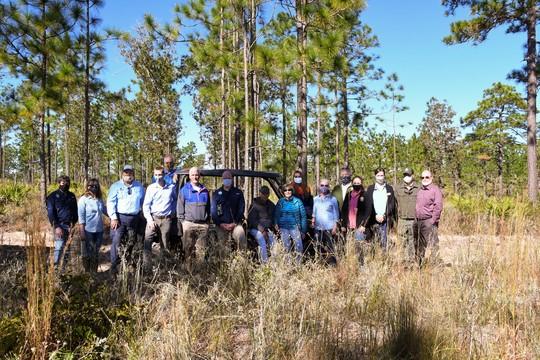
“Our springs are a litmus test for Florida’s water quality; they are the barometer of the effectiveness of our land management activities,” said DEP Secretary Valenstein. “What happens on the land can affect our groundwater, creating a ripple effect that impacts every component of our environment. Protecting and preserving Florida’s natural and rural lands is a critical step in ensuring our key ecosystems are allowed to flourish. These projects highlight the importance of science-based decisions for land conservation and efforts to preserve one of Florida’s unique natural resources.”
Senator, DEP Secretary and Environmental Leaders Tour Critical Land Conservation Projects
Senator Keith Perry, Florida Department of Environmental Protection Secretary Noah Valenstein and other environmental leaders recently visited several land acquisition projects in the Suwannee Valley, which illustrate the importance of land conservation and its role in protecting Florida’s springs.
The day included a visit to Gilchrist County’s Bell Ridge Sandhills site located within the Devil’s Ear Spring Priority Focus Area – a 3,000-acre grassland ecosystem with a critical role in water recharge of the Floridan Aquifer. This land is proposed to be preserved through a conservation easement funded in part by the Florida Forever program, springs funding through the Suwannee River Water Management District and the U.S. Fish and Wildlife Service to ensure the continued protection of these vital lands and resources.
Springs are the window into the health of Florida's groundwater. DEP protects the vital springs resources through a variety of funding programs, including Florida Forever, the state’s premier conservation and recreation lands acquisition program. Through Florida Forever and other programs, environmental partners at the federal, state and local level are working to better protect Florida’s springs and other natural resources. During the site visits, environmental leaders discussed the importance of stakeholder partnerships in ensuring the conservation of lands for habitat protection, aquifer recharge and water quality statewide.
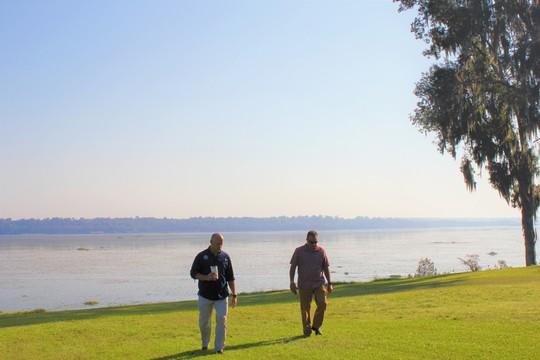
“It was an honor to join Secretary Valenstein to visit the Red Hills Conservation Florida Forever Project,” said CFO Jimmy Patronis. “The Florida Forever Project is crucial to conserving natural lands and waterways and renewing Florida’s commitment to conserve the state’s natural and cultural heritage. This partnership has proven to be great for Florida’s economy and the economic impact from longleaf ecosystems provides a great benefit for our state. I’d like to thank all of the environmental leaders who are working hard to ensure Florida’s natural resources are protected for future generations.”
Chief Financial Officer and DEP Secretary Visit Red Hills Conservation Florida Forever Project
Highlighting Florida’s continued efforts to conserve and protect the state’s natural resources, Chief Financial Officer Jimmy Patronis, Department of Environmental Protection Secretary Noah Valenstein and various environmental leaders visited the Red Hills Conservation Florida Forever Project, located in the Red Hills region of North Tallahassee. During the visit, attendees witnessed first-hand the work that goes into protecting endangered longleaf pine forests, Lake Miccosukee and various regional ecosystems surrounding the property.
“Land conservation has a far-reaching impact on virtually every component of our environment and communities,” said DEP Secretary Valenstein. “It is a critical component in our collaborative efforts to ensure our natural resources are protected and remain healthy for generations to come. This property is a great example of the continued coordination among environmental stakeholders that has strengthened our ability to safeguard our state's conservation lands.”
Governor DeSantis Announces Preparation for Algal Bloom Mitigation Following Announcement
Following an announcement by the Army Corps of Engineers (Corps) that they will release of harmful discharges from Lake Okeechobee to the Caloosahatchee and St. Lucie estuaries, Governor Ron DeSantis charged DEP and the South Florida Water Management District to proactively deploy innovative technology to mitigate the risk of blue-green algae blooms.
“This action is a direct result of recommendations made by the Governor’s Blue-Green Algae Task Force. Although the task force emphasized the importance of preventative measures, they recommended clearly that DEP invest in a broad suite of technologies including those capable of reducing the abundance of algae and toxins they produce,” said Chief Science Officer Dr. Tom Frazer. “The application of the proprietary algaecide to release water coming from Lake Okeechobee holds a great deal of promise and we are prepared to evaluate the efficacy of the technology to help guide future mitigation efforts around the state.”
“Harmful algal blooms have a debilitating effect on our ecosystems and our communities,” said Governor DeSantis. “That is why, for the first time, I made it a priority to secure dedicated funding to deploy innovative technology to mitigate blue-green algae blooms. I will continue to advocate for better management of Lake Okeechobee and the resources needed to bolster our natural resource protection efforts. Our economy and way of life depend on it.”
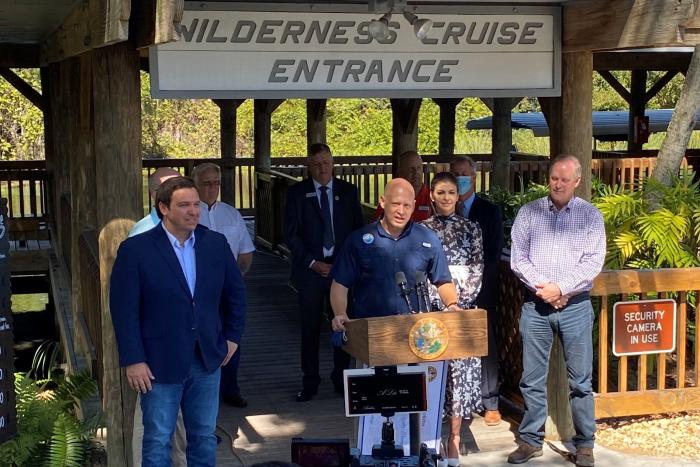
“Thanks to Governor DeSantis’ leadership, DEP is engaged in a broad suite of water quality improvement efforts across the state,” said DEP Secretary Noah Valenstein. “Of particular importance to the state are those projects tied to springs restoration.This diverse selection of projects will be complemented and enhanced by department initiatives to increase facility inspections, water quality monitoring and enforcement.”
Governor DeSantis announced $50 million for statewide springs restoration projects
Governor Ron DeSantis announced $50 million for more than 20 statewide springs restoration projects to aid the recovery and provide additional protection for Florida’s springs. These projects work in concert with increased monitoring, enforcement, and other measures to ensure compliance with best management practices implemented under the Governor’s leadership to improve water quality across the state.
"Florida’s springs are integral to both our economy and environment,” said Governor DeSantis. “Our state is home to more large springs than any other state in the nation and they serve as a fun source of recreation for our residents and visitors to enjoy.
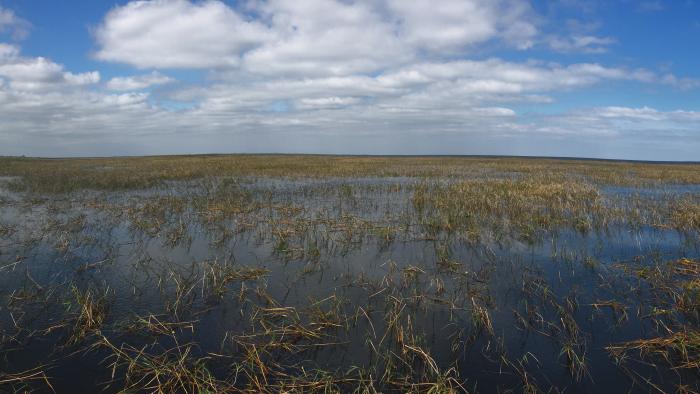
“Lake Okeechobee continues to be at the center of many discussions surrounding water quality in Florida, and rightfully so,” said Governor DeSantis. “Lake Okeechobee has far reaching impacts on Florida’s natural resources. The allocation of more than $5 million in grant funding will ensure our state’s environmental leaders can continue enhancing our ability to monitor and protect water quality and marine life for years to come.”
Governor DeSantis Highlights $5.2 Million in Lake Okeechobee Water Quality Research Grants
Governor Ron DeSantis announced more than $5 million in grant funding will be awarded to the South Florida Water Management District and Florida Atlantic University’s Harbor Branch Oceanographic Institute as part of Florida’s continued efforts to protect water quality and the Sunshine State’s natural resources.
The two grant recipients will be using the funding to implement enhanced nutrient removal technologies, water quality monitoring and data sharing and work to improve the relationship between environmental conditions and nutrient dynamics in Lake Okeechobee. These efforts will result in a better scientific understanding and management of nutrient conditions in Lake Okeechobee.
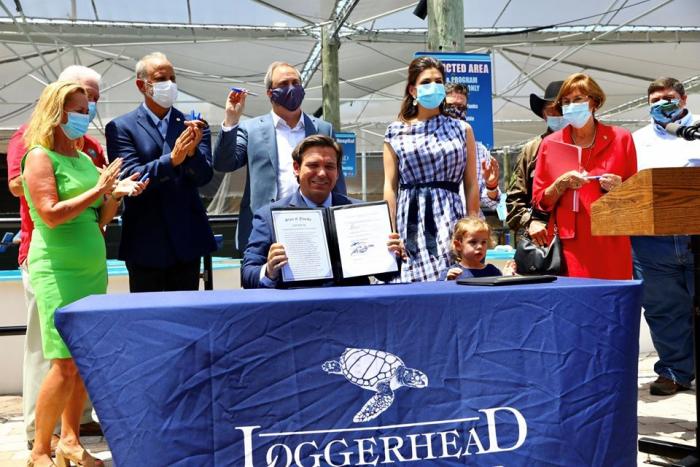
Senate Bill 712 was sponsored by Sen. Debbie Mayfield and Rep. Bobby Payne
Governor DeSantis Signs Senate Bill 712 “The Clean Waterways Act”
Governor Ron DeSantis made another historic step in Florida’s fight to protect water quality and conserve the state’s natural resources by signing Senate Bill (SB) 712. This bill carries a wide range of water quality protection provisions aimed at minimizing the impact of known sources of nutrient pollution, realigning the State’s resources to enhance the protection of Florida’s environment, and strengthening regulatory requirements.
Governor DeSantis Signs HB 1091
Governor Ron DeSantis signed House Bill 1091 that was passed unanimously during the 2020 Legislative Session. HB 1091 includes a 100% increase in penalties for sanitary sewer overflows and an across-the-board 50% increase for all other environmental fines. Governor DeSantis has made enforcement of the state’s environmental laws a top priority. “The department is grateful for the Governor’s and legislature’s commitment to environmental enforcement,” said DEP Secretary Noah Valenstein. “These penalty increases will provide an additional tool for the department to enforce Florida’s environmental laws.”
Governor DeSantis Announces Commencement of EAA Reservoir Project Site Work
Governor DeSantis, the South Florida Water Management District and the Florida Department of Environmental Protection announced that site work has begun for the EAA Reservoir Project after recently receiving the required federal permit. The project provides ecological benefits, reduces harmful discharges to the St. Lucie and Caloosahatchee estuaries, and sends more clean water south to the Everglades.
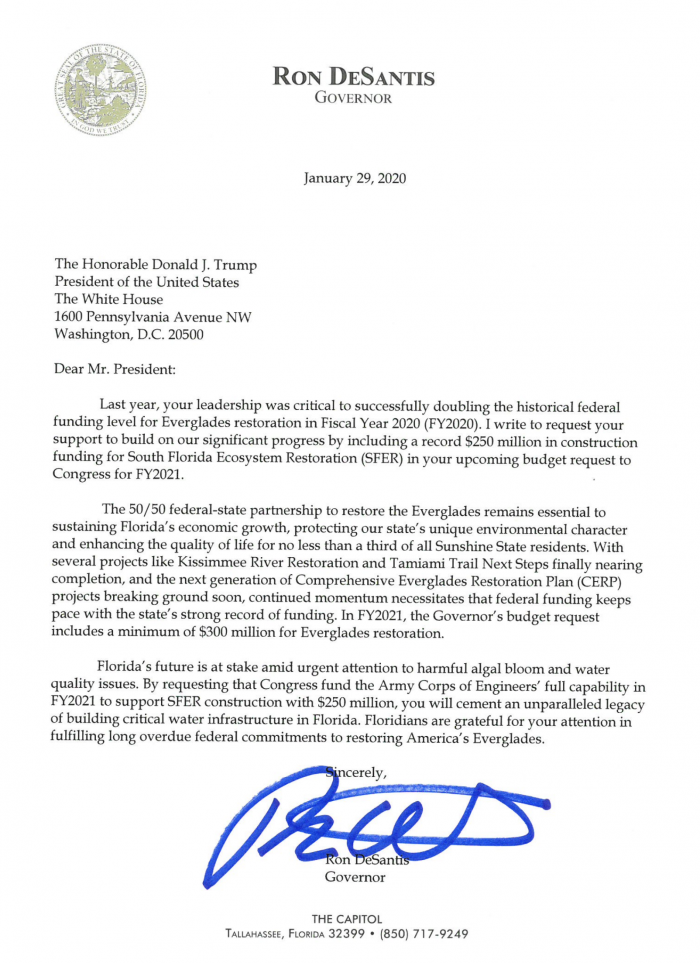
Governor DeSantis Commends President Donald Trump for Historic Everglades Restoration Funding Request
Governor Ron DeSantis commended President Donald Trump for including $250 million for South Florida Ecosystem Restoration (SFER) in his budget request to Congress for Fiscal Year 2021. This comes after Governor DeSantis recently sent a letter to President Trump requesting that he include $250 million in his request to Congress to build on last year’s $200 million in federal Everglades restoration funding.
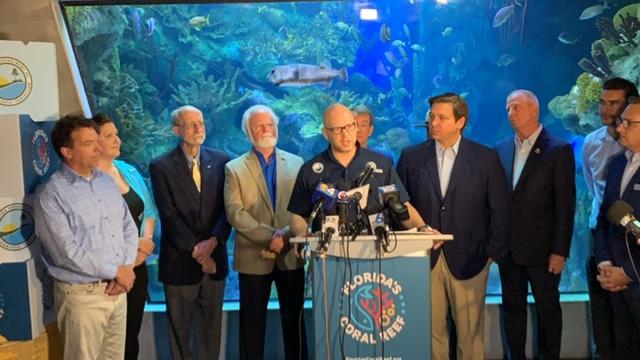
Governor DeSantis Joins DEP, FWC and Other Partners to Kickoff Launch of Florida’s Coral Reef Campaign
Governor Ron DeSantis was joined by DEP Secretary Noah Valenstein, FWC Executive Director Eric Sutton and other partners to kickoff 100 Yards of Hope and announce a new initiative to promote awareness and protection of Florida’s Coral Reef ecosystem.
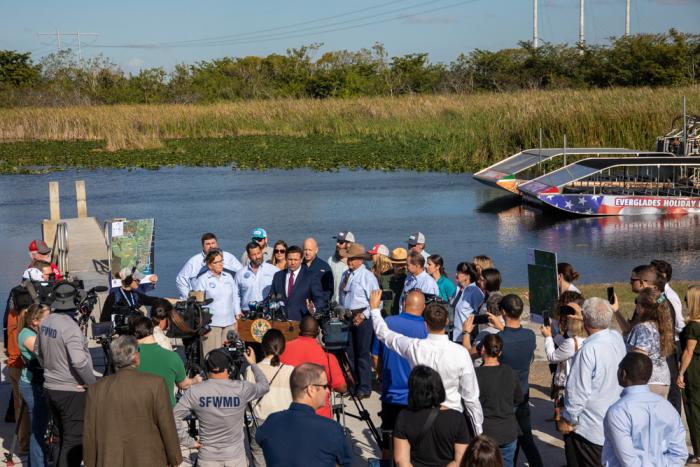
Governor DeSantis Announces Agreement for Acquisition of 20,000 Acres of Critical Everglades Wetlands
Governor Ron DeSantis announced the Florida Department of Environmental Protection (DEP) has reached an agreement with Kanter Real Estate LLC., that will allow for the purchase of 20,000 acres of critical wetlands in Water Conservation Area 3 (WCA 3) within the Everglades Protection Area located in Broward County. This acquisition would represent the largest wetland acquisition in a decade.
Governor DeSantis Applauds President Donald Trump’s Significant Increase in Everglades Restoration Funding
Governor Ron DeSantis applauded President Donald Trump for securing $200 million for Everglades restoration in the federal budget that the President signed into law. Since taking office, Governor DeSantis has championed historic investments in Everglades restoration and water quality to protect Florida’s precious natural resources. The $200 million federal appropriation secured by President Trump for South Florida Ecosystem Restoration is a $130 million increase in Everglades restoration funding from last year. This important funding advances critical Everglades restoration projects including the Everglades Agricultural Area (EAA) Reservoir Project, which will help reduce harmful discharges to the Caloosahatchee and St. Lucie estuaries and send more water south.
Governor DeSantis Announces Advancement of Old Tamiami Trail Roadbed Removal Project
Governor Ron DeSantis announced that the South Florida Water Management District Governing Board voted yesterday to advance an important Everglades restoration project and remove 5.5 miles of Old Tamiami Trail roadbed in Miami-Dade County. Removing the roadbed improves the volume of water flowing south through the Everglades into Everglades National Park. Recently, Governor DeSantis announced DEP issued the required permit for the project.
This critical project is a component of the larger Central Everglades Planning Project (CEPP), which also includes the Everglades Agricultural Area (EAA) Reservoir Project. CEPP will help deliver additional freshwater from Lake Okeechobee south to Water Conservation Area 3, Everglades National Park and Florida Bay. The project is in Miami-Dade County south of U.S. 41 between the L-67 Extension Canal and Shark Valley Loop Road. Elevating Tamiami Trail (U.S. 41), removing roadbed, and restoring the historic sheet flow of water south are all part of Governor Ron DeSantis’ Everglades restoration priorities.
Environmental Leaders React to Governor DeSantis’ Bolder, Brighter, Better Future Budget
Governor Ron DeSantis released his Bolder, Brighter, Better Future budget, which continues historic levels of funding for the environment, including Everglades restoration, targeted water quality improvements, alternative water supply and innovative technologies. View what environmental leaders and stakeholders are saying about the proposed budget.
Governor DeSantis Announces His Bolder, Brighter, Better Future Budget for FY 2020-2021
The budget includes more than $625 million in recurring funding for Everglades restoration and the protection of vital water resources, positioning Florida to be able to reach the Governor’s goal of investing $2.5 billion over four years. Included in the more than $625 million investment is more than $322 million for Everglades restoration projects, $150 million for water quality improvements, $50 million for springs restoration and more than $22 million to combat the harmful effects of algal blooms and red tide. The budget also invests $50 million in beach nourishment to address Florida’s critically eroded shorelines, nearly $9 million in coral reef protection funding, as well as $154 million to protect Florida’s prized properties and water: $100 million for the Florida Forever Program and $54 million in new funding for state parks.
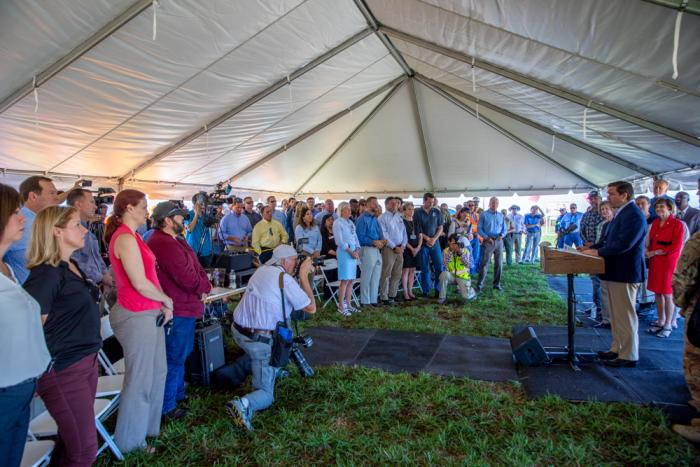
The C-44 Reservoir will store 50,000 acre-feet of water, including local basin runoff and Lake Okeechobee releases. This will reduce harmful releases reaching the St. Lucie Estuary that can fuel harmful algal blooms. The C-44 STA will treat the water stored in the reservoir before it is released into the estuary.
Governor DeSantis Activates C-44 Stormwater Treatment Area
Governor Ron DeSantis visited the C-44 Reservoir and Stormwater Treatment Area (STA) site to highlight Everglades restoration and activate the pumps which began the process of filling the manmade wetland with water. The C-44 STA will remove harmful nutrients and provide regional water quality benefits. Joined by Florida Department of Environmental Protection (DEP) Secretary Noah Valenstein, the South Florida Water Management District (SFWMD), conservation groups, the U.S. Army Corps of Engineers and local community leaders, Governor DeSantis celebrated this important Everglades restoration project as water filled the wetland.
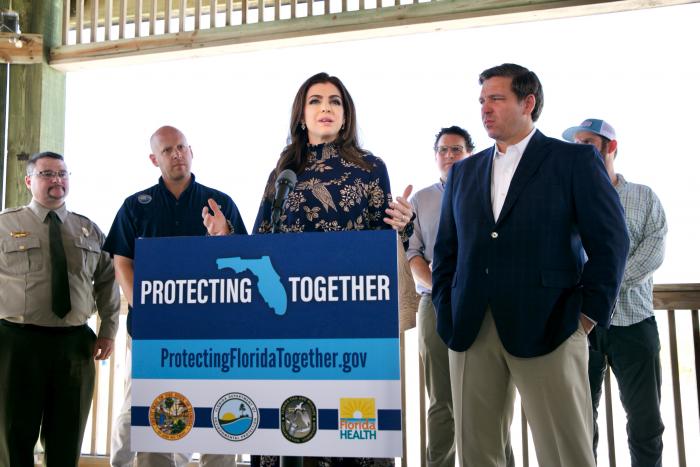
The initial version of the Protecting Florida Together water quality status map focuses on blue-green algae, red tide and nutrient concentrations in the St. Lucie and Caloosahatchee rivers and their respective estuaries, and Lake Okeechobee. Additional features will include an expanded statewide map to be added over the next year.
Governor DeSantis and First Lady Join DEP, DOH and FWC to Launch First-Ever Comprehensive Water Quality Dashboard
Governor Ron DeSantis and First Lady Casey DeSantis held events in Fort Myers and Stuart to announce the launch of ProtectingFloridaTogether.gov, the state’s first-ever comprehensive water quality dashboard. The Governor and First Lady were joined by Florida Department of Environmental Protection (DEP) Secretary Noah Valenstein, State Surgeon General Dr. Scott A. Rivkees, Chief Science Officer Dr. Thomas Frazer, Florida Fish and Wildlife Conservation Commission (FWC) Executive Director Eric Sutton, Congressman Brian Mast and other environmental stakeholders.
Governor DeSantis Breaks Ground on Embankments and Canals to Complete the C-43 Reservoir
Governor Ron DeSantis visited the site of the Caloosahatchee (C-43) West Basin Storage Reservoir to break ground on the embankments and canals to complete this important Everglades restoration project. The Governor was joined by members of the South Florida Water Management District (SFWMD) and the Florida Department of Environmental Protection (DEP), as well as conservation groups, local community leaders and other environmental stakeholders.
Governor DeSantis Announces Removal of Tamiami Trail Roadbed
Governor Ron DeSantis announced that the Florida Department of Environmental Protection (DEP) has issued a permit to the Department of Interior’s National Park Service, Everglades National Park, for the removal of 5.45 miles of roadbed along the Tamiami Trail (U.S. 41). This critical project is a component of the larger Central Everglades Planning Project (CEPP), which also includes the Everglades Agricultural Area (EAA) Reservoir Project. CEPP will provide the necessary components to deliver additional freshwater from Lake Okeechobee south to Water Conservation Area 3, Everglades National Park and Florida Bay. Bridging Tamiami Trail remains one of Governor DeSantis’ priority Everglades restoration projects.
Governor DeSantis and Florida Cabinet Take Action to Expedite Construction of EAA Reservoir Project
Governor Ron DeSantis and the Florida Cabinet took action to expedite construction of the Everglades Agricultural Area (EAA) Reservoir Project. During today’s meeting of the Governor and Cabinet, the Board of Trustees of the Internal Improvement Trust Fund approved the early termination of a state lease with Florida Crystals on lands needed for the EAA Reservoir Project.
Environmental Leaders Praise Governor DeSantis’ Legislation to Expedite Water Quality Improvements
View the full press release to see what state officials and environmental stakeholders are saying about the announcement.
Governor DeSantis Announces Legislation to Expedite Water Quality Improvements
Governor Ron DeSantis announced proposed legislation for the 2020 Legislative Session that will expedite water quality improvements throughout Florida. The legislation incorporates recommendations of the Blue-Green Algae Task Force, which the Governor created shortly after taking office to aid DEP in protecting, conserving and managing the state’s natural resources.
Blue-Green Algae Task Force Comes to Consensus on First Set of Water Quality Improvement Recommendations
The Blue-Green Algae Task Force met and approved its first set of recommendations to address water quality and harmful algal blooms. The Blue-Green Algae Task Force is an advisory body, appointed by Governor Ron DeSantis, to aid the Department of Environmental Protection (DEP) in fulfilling its mission to protect, conserve and manage the state’s natural resources and enforce its environmental laws. The task force, through its discussion and deliberations, provides guidance and specific, science-based recommendations with the goal of expediting improvements and restoration of Florida’s water bodies that have been adversely affected by blue-green algae blooms.
Governor DeSantis Announces Early Termination of the lease on Lands Needed for Construction of the EAA Reservoir
Governor DeSantis, the South Florida Water Management District and the Florida Department of Environmental Protection announced the early termination of the Florida Crystals Lease for the stormwater treatment area (STA) component of the Everglades Agricultural Area (EAA) Reservoir Project. The termination of this lease on the STA footprint is an important step as it is critical for the necessary access for site preparation and will allow the District to meet its expected construction schedule.
DEP Announces Opportunities to Expand Water Quality Restoration Efforts
DEP announces new opportunities for all public and private parties to help expand the state's water quality restoration efforts. In light of the Executive Order signed by Governor DeSantis just 48 hours after taking office, which prioritized science-based solutions and immediate action to implement water quality improvement projects, DEP is embarking on an expanded public solicitation process to identify projects for future funding opportunities.
Governor DeSantis Requests $625 Million in Recurring Funds for Everglades Restoration and Protection of Water Resources
This funding will meet the $2.5 billion goal outlined in the Governor’s Bold Vision for a Brighter Future budget. The Governor also announced his support for legislation to increase fines for environmental crimes by 50 percent across the board. The legislation will also empower DEP to assess daily fines until the environmental harm has been remedied or a plan has been developed.
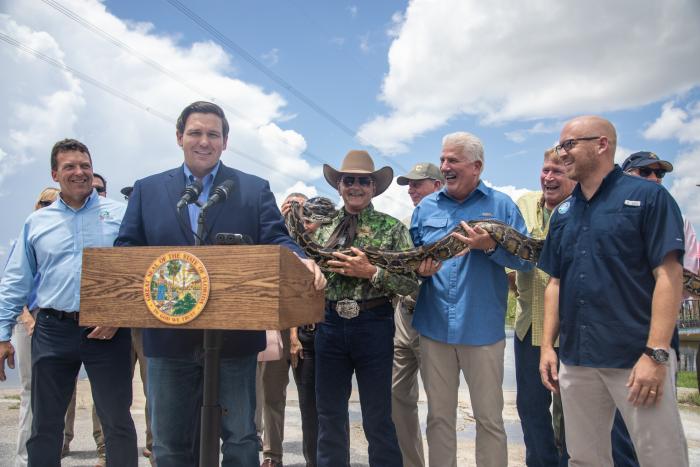
Pythons decimate other animal populations, disturbing Florida’s delicate ecosystems and threatening the biodiversity in the Everglades and surrounding areas.
Python Removal Efforts To Protect The Greater Everglades
Governor Ron DeSantis joined the Florida Fish and Wildlife Conservation Commission (FWC) and the South Florida Water Management District (SFWMD) to announce new efforts to remove pythons from the Greater Everglades.
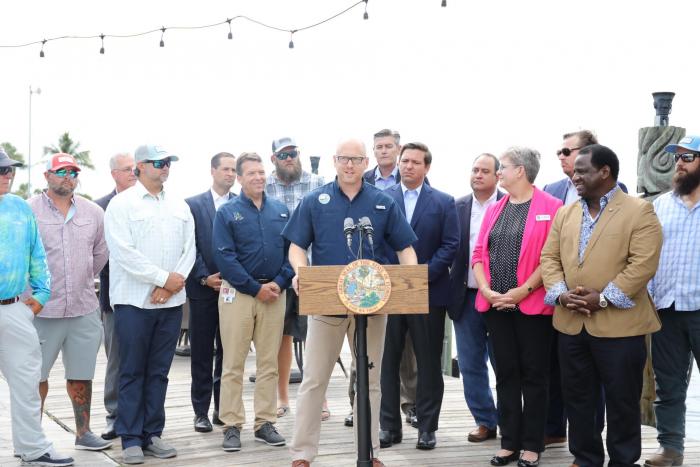
Governor Desantis Announces Appointments to Red Tide Task Force
Secretary Valenstein joined the Governor for the announcement of 11 expert researchers to the recently reorganized Red Tide Task Force.
Governor Ron Desantis Announces Dr. Julia Nesheiwat As Florida’s First Chief Resilience Officer
Governor DeSantis has announced the appointment of Dr. Julia Nesheiwat as Florida's first Chief Resilience Officer (CRO).
New DEP Environmental Crimes Unit Makes First Arrest
In the first arrest by the new DEP Environmental Crimes Unit, a Tampa resident was charged with felony dumping for commercial purposes. A DEP Southwest District Office investigator found video evidence of the suspect dumping two drums of a corrosive material into a Tampa alley.
Record Investments For Florida’s Environment
Governor Ron DeSantis visited Audobon’s Corkscrew Swamp Sanctuary in Naples to highlight record environmental funding in his Bold Vision for a Brighter Future state budget.

"Governor DeSantis has continued to make it very clear that it is his expectation that Florida’s environmental laws are enforced,” said DEP Secretary Noah Valenstein. “We are committed to carrying out this directive and are pleased to have this additional tool to do more for Florida’s environment now.”
Governor Desantis Signs House Bill 5401
Governor Ron DeSantis signed HB 5401. The bill implements the directive in Executive Order 19-12, to transfer the Environmental Crimes Unit from the Florida Fish and Wildlife Conservation Commission to the Florida Department of Environmental Protection.
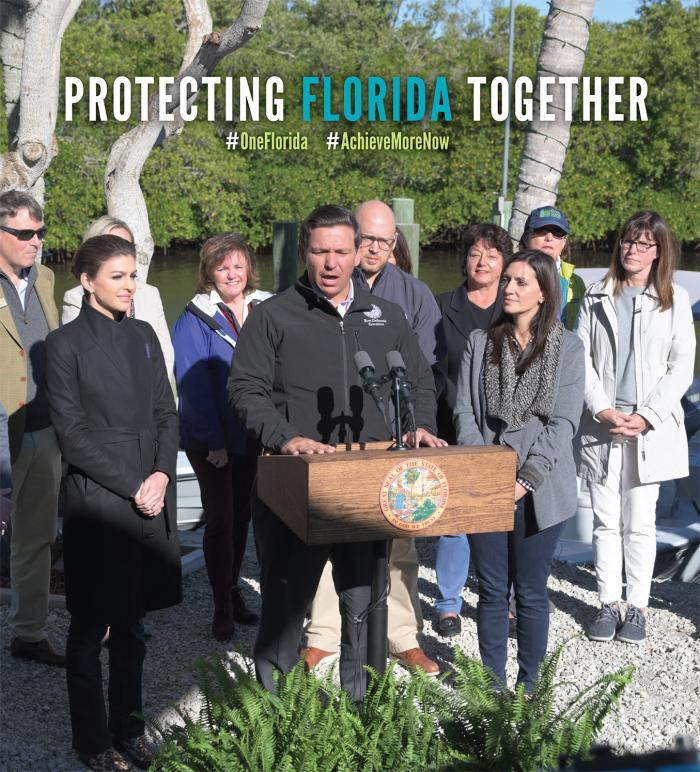
The budget supports major reforms implemented by Governor DeSantis in Executive Order 19-12 to ensure the protection of Florida’s environment and water resources. Most notably, it includes more than the $625 million the Governor requested for Everglades restoration and initiatives to protect the state’s water resources.
Bold Vision For A Brighter Future Budget Signed
Governor Ron DeSantis signed the Bold Vision for a Brighter Future state budget for fiscal year 2019-2020.
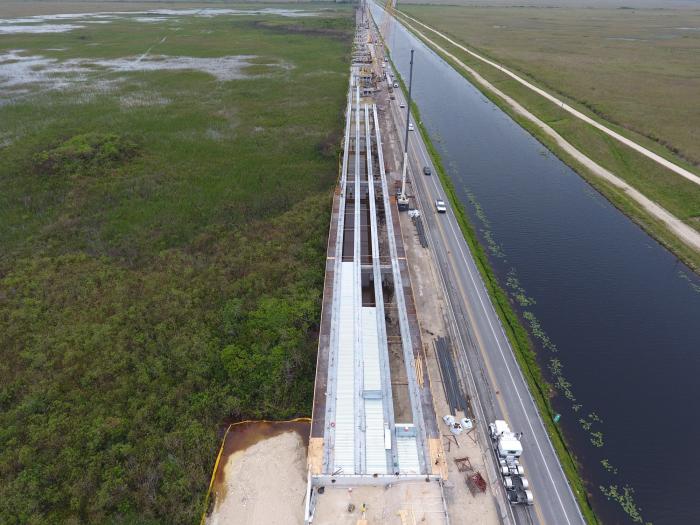
"This announcement today is great news for Everglades Restoration and water quality in Florida,” said DEP Secretary Noah Valenstein. “With the Governor’s leadership and federal partnership, we will be able to complete critical water projects like the Tamiami Trail Bridge Project, and continue expediting our efforts to do more for Florida’s environment now.”
Full Funding For Critical Tamiami Trail Project
Governor Ron DeSantis announced that full funding has been secured to complete the project to elevate the Tamiami Trail. The U.S. Department of Transportation has matched the state of Florida’s $40 million for the Tamiami Trail by awarding an additional $60 million to fully fund and allow for the completion of the Tamiami Trail Next Steps Phase II project, which is critical to the Governor’s plan to preserve the environment.
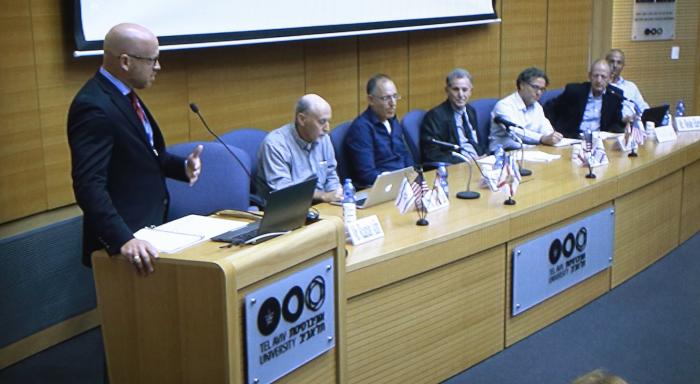
Topics discussed by roundtable participants ranged from water quantity, including reuse and innovative technology to 21st century infrastructure like leak detection and mitigation technology. Panelists also discussed technologies to improve water quality and creating a culture of water ethics focused on conservation and sustainability.
Discussion On Water Challenges In Florida And Israel
Governor Ron DeSantis and DEP Secretary Noah Valenstein led a roundtable discussion on water challenges in Florida and the contributions that Israeli technologies could lend to ongoing water management efforts.
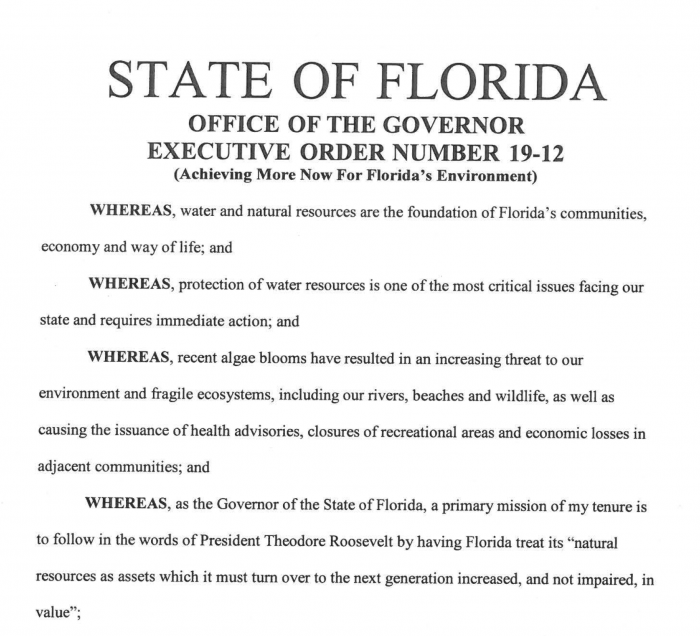
On Governor DeSantis’ second full day in office, he issued Executive Order 19-12 (Achieving More Now for Florida’s Environment), implementing major reforms to ensure the protection of Florida’s environment and water quality.
Historic Investment In Everglades Restoration And Water Resources
Governor Ron DeSantis and environmental leaders reflected on the Florida Legislature’s work in providing historic funding toward Everglades restoration and Florida’s water resources.
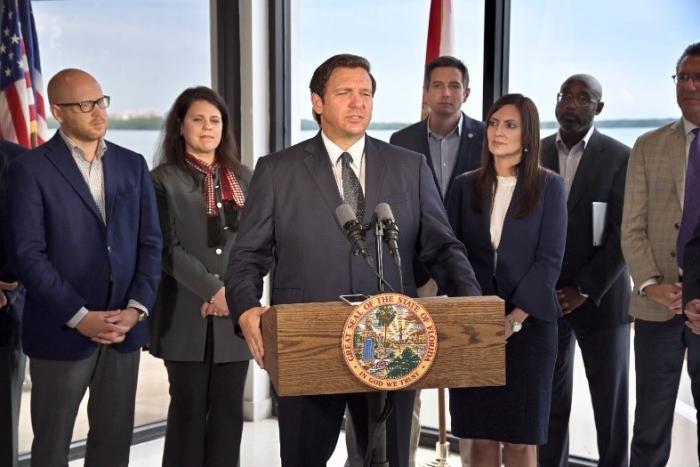
The Governor was joined by Lieutenant Governor Jeanette Nuñez and Department of Environmental Protection (DEP) Secretary Noah Valenstein.
Bold Vision For Protecting Florida’s Environment
Governor Ron DeSantis spoke at the University of Miami Rosenstiel School of Marine and Atmospheric Science regarding his bold vision to protect Florida’s environment.
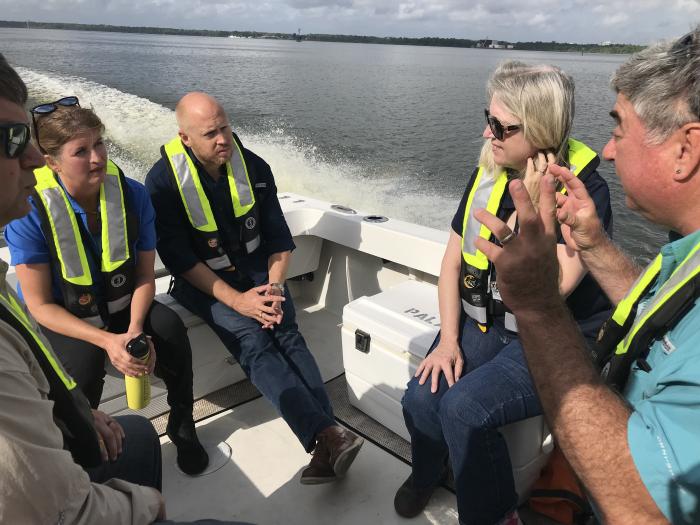
St. Johns Tour Of Algal Bloom
DEP Secretary Noah Valenstein joined St. Johns River Water Management District Executive Director Dr. Ann Shortelle, St. Johns Riverkeeper Lisa Rinaman and agency water quality experts to examine an active algal bloom on the lower St. Johns River and to discuss nutrient reduction and remediation projects.
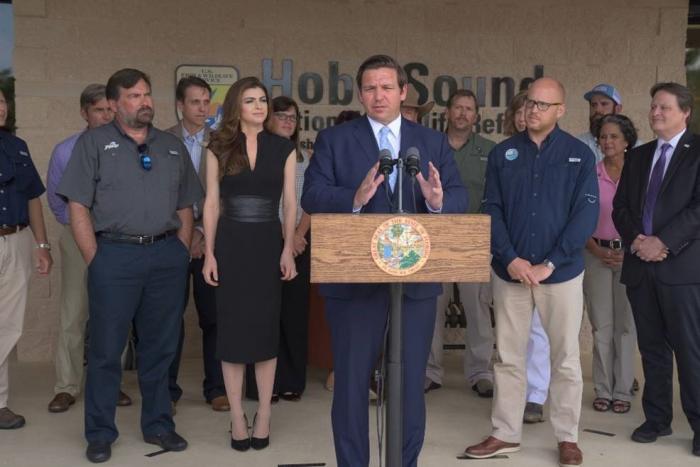
Governor Ron DeSantis announced the appointments of five expert researchers and leading scientists to the newly established Blue-Green Algae Task Force. The Governor was joined by First Lady Casey DeSantis and Florida Department of Environmental Protection (DEP) Secretary Noah Valenstein.
Blue-Green Algae Task Force Appointments
The focus of the Blue-Green Algae Task Force is to support key funding and restoration initiatives and make recommendations to expedite nutrient reductions in Lake Okeechobee and the downstream estuaries. The Task Force will identify opportunities to fund priority projects with state, local and federal funding.
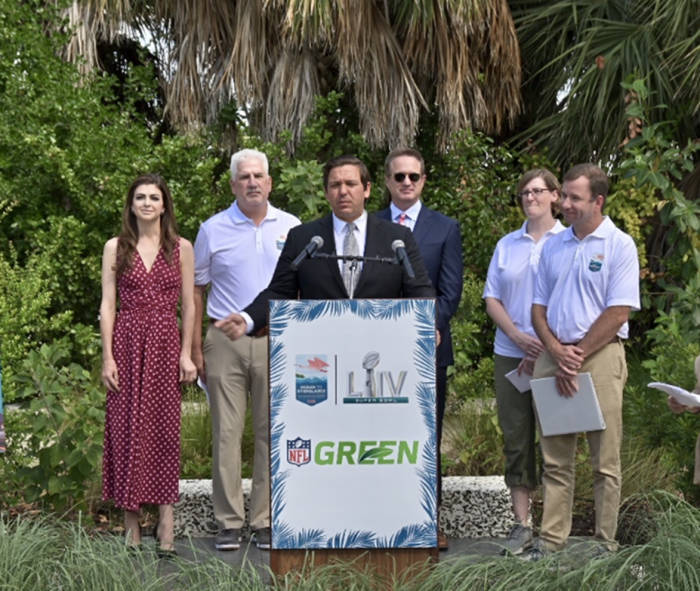
The initiative is a partnership between the host committee, NFL Green, Ocean Conservancy and The Everglades Foundation to raise awareness and reduce the environmental impact of the Super Bowl.
Super Bowl LIV Environmental Initiative Ocean To Everglades
Governor Ron DeSantis joined the Miami Super Bowl Host Committee to help launch Ocean to Everglades (O2E), the Super Bowl LIV environmental initiative.
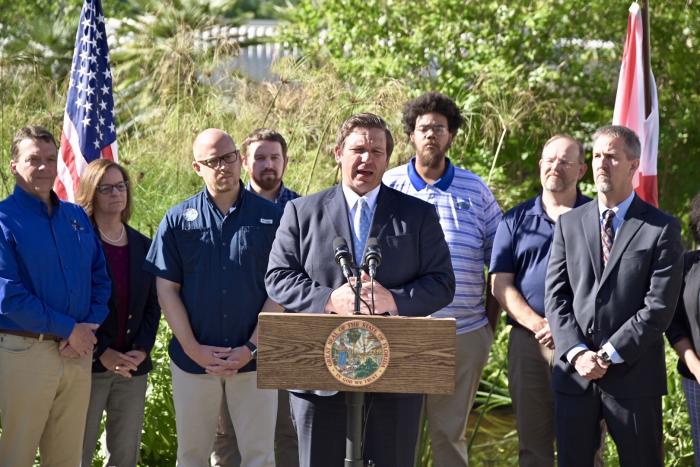
The Governor was joined by Department of Environmental Protection (DEP) Secretary Noah Valenstein, Chief Science Officer designee Dr. Tom Frazer, and University of Florida President Dr. Kent Fuchs.
Governor Outlines Environmental Priorities At The University Of Florida
Governor Ron DeSantis participated in a roundtable discussion outlining his environmental priorities regarding $625 million for Everglades restoration, the appointment of a Chief Science Officer, and a strategic plan to combat blue-green algae blooms and red tide.

During the Captains for Clean Water Skiff Challenge, skiff manufacturers put their boats and best teams to the ultimate endurance test, circumnavigating the state of Florida in a nonstop race from Pensacola to Jacksonville, a total of 1,300 miles.
Governor Attends Captains For Clean Water Skiff Challenge
Governor Ron DeSantis, joined by First Lady Casey DeSantis, spoke at the Captains for Clean Water Skiff Challenge, an annual test of endurance in which teams circumnavigate the state to highlight the need to protect Florida’s water quality, Everglades and environment.
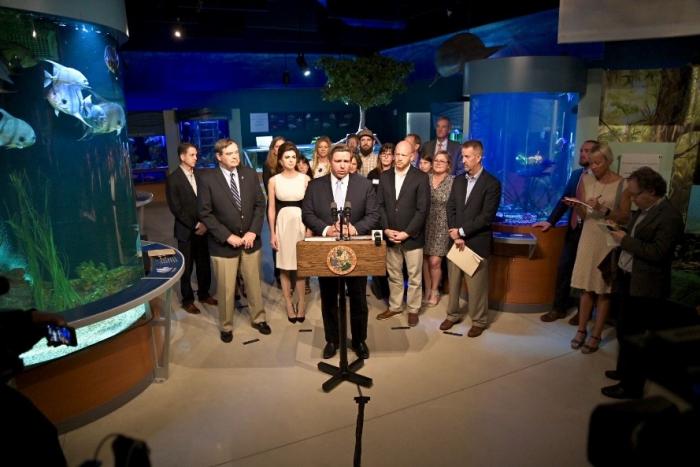
Governor Ron DeSantis announced the appointment of Dr. Thomas K. Frazer as Florida’s first Chief Science Officer.
Governor Appoints Dr. Thomas K. Frazer As Chief Science Officer
In his newly created role at DEP, Frazer will lead the effort to ensure sound science is at the forefront of the mission to achieve more now for Florida’s environment.
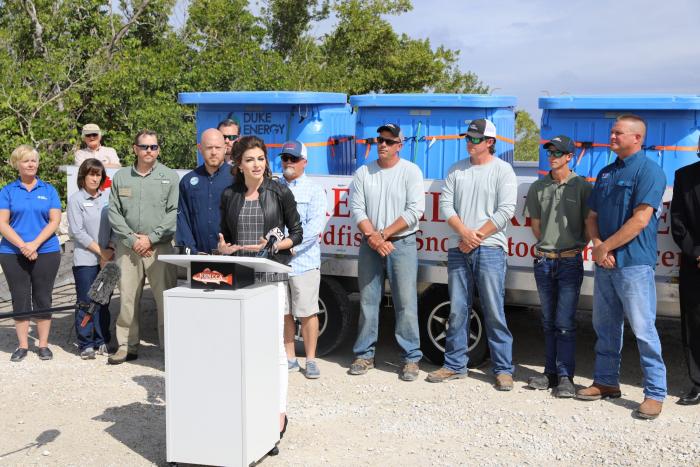
The release included approximately 2,000 juvenile fish and 30 adult redfish.
DEP Joins First Lady For Red Tide Recovery Redfish Release
First Lady Casey DeSantis led a red tide recovery effort in Collier County with the shoreline release of more than 2,000 redfish. FWC, Duke Energy and Coastal Conservation Association Florida have joined forces to address the decline in redfish numbers along the southwest coast as a result of red tide.
Chief Science Officer Applications
DEP closed a worldwide search for the Chief Science Officer and received 34 applications.
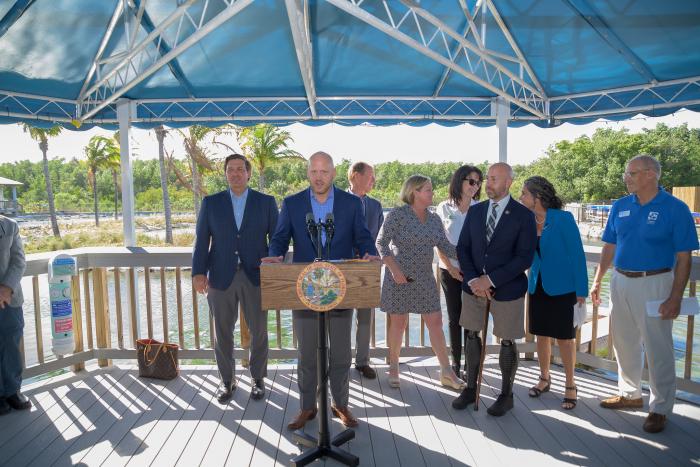
Naples and Stuart, Florida
Environmental Event in South Florida
Governor Desantis appoints three key members to the South Florida Water Management District Board.
DEP Meets with U.S. Army Corps Of Engineers
DEP participated in the U.S. Army Corps of Engineers public meeting regarding updates to the Lake Okeechobee Release Schedule.
Established Blue-Green Algae Task Force
DEP established the Blue-Green Algae Task Force and initiated search to select members, including sending letters to state universities to encourage Florida’s academic leaders to participate.
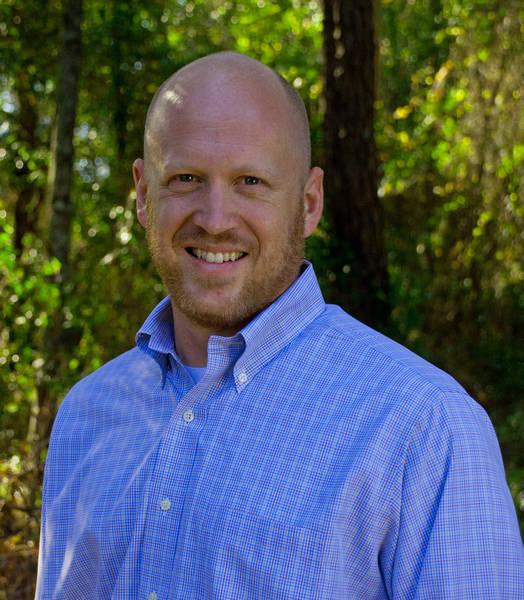
Appointment Of Dep Secretary Noah Valenstein
Governor DeSantis appointed Noah Valenstein as secretary of the Department of Environmental Protection, which was unanimously confirmed by the Florida Cabinet.
DEP Directs Water Management Districts On Priorities
DEP directed each water management district to prioritize its budget to reflect the vision laid out by Governor DeSantis in an executive order and to increase collaboration, transparency and accountability.
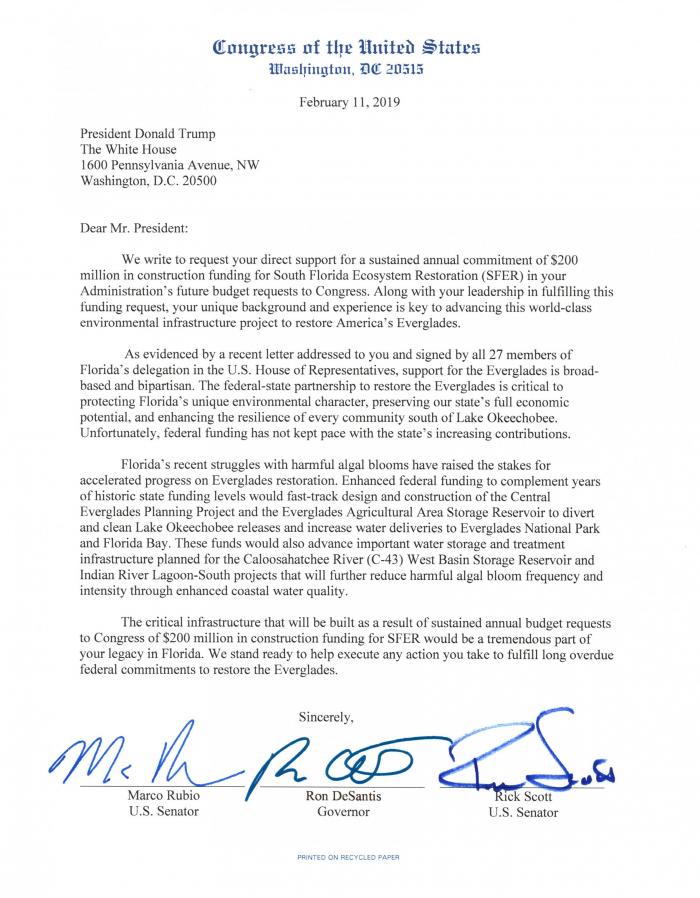
Letter To President Trump
Governor DeSantis, along with U.S. Senators Rick Scott and Marco Rubio, sent a letter to President Donald Trump requesting the prioritization of the $200 million annual commitment from the Federal Government for its portion of Everglades Restoration.
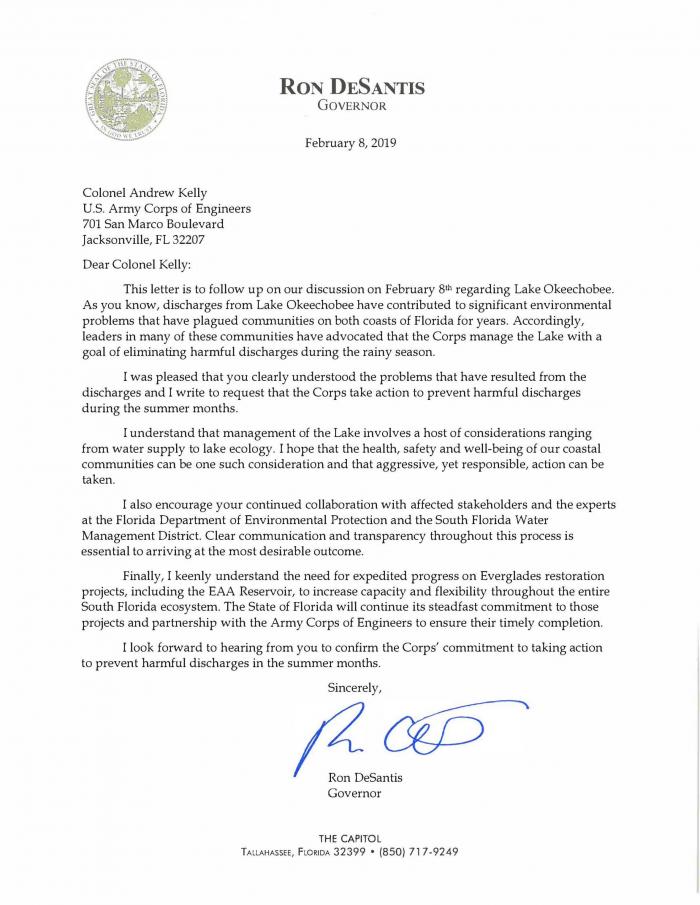
Letter to U.S. Army Corps of Engineers
Governor DeSantis sent a letter to U.S. Army Corps of Engineers Colonel Andrew Kelly requesting that the USACE engage with stakeholders throughout South Florida as they make updates to Lake Okeechobee management tools that affect release schedules.
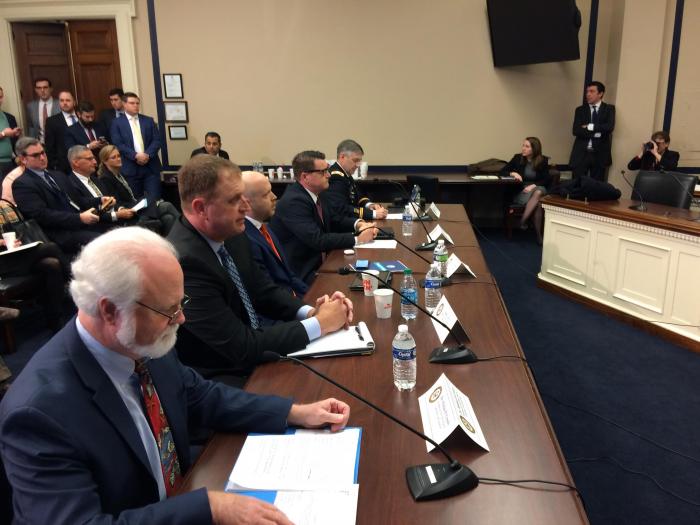
Washington, D.C.
DEP Secretary Meets Congressional Delegation
Secretary Valenstein spoke with legislative partners about the agency’s priorities and how they will be implemented through Governor DeSantis’ Bold Vision for a Brighter Future budget. Secretary Valenstein addressed the House Agriculture and Natural Resources meeting, as well as, the Senate Appropriations Subcommittee on Agriculture, Environment, and General Government meeting. The Secretary broke down the recommended $625 million for Florida’s water resources into four categories: Everglades restoration, targeted water quality improvements, springs restoration and alternative water supply. Additionally, he highlighted the impact that data, enforcement and partnerships have on protecting Florida’s natural resources. Investing in these initiatives will achieve more now for Florida’s environment.
Request to Reverse Oil Drilling Permit
DEP filed a Motion for Rehearing and a Request to Certify the case to the Florida Supreme Court regarding the recent opinion reversing the department’s decision to deny the Kanter Real Estate exploratory oil drilling permit in the Everglades.
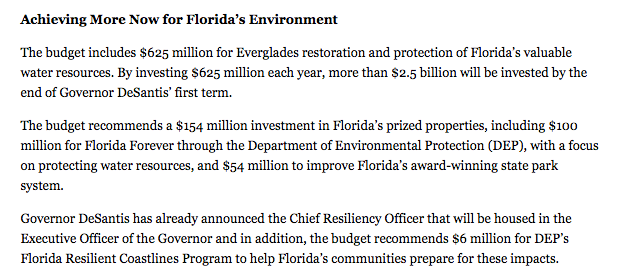
DEP began searching for individuals for the Governor to consider.
New Chief Resiliency Officer
Governor DeSantis announced he would appoint a Chief Resiliency Officer to be housed in the Executive Office of the Governor.
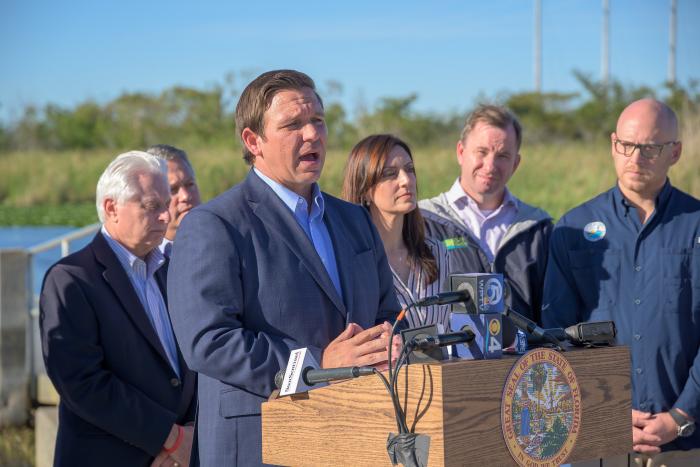
Naples and Fort Lauderdale, Florida
South Florida Water Management District Board Appointments
Governor Desantis announces his intent to appoint two key leaders to the South Florida Water Management District Board.
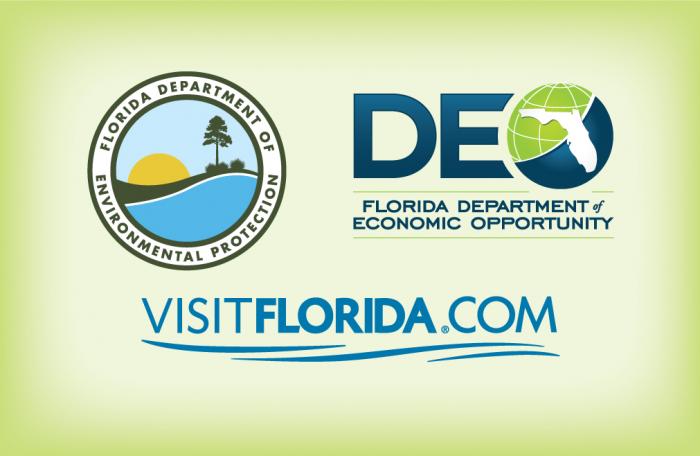
Agencies Initiate Partnership
Florida's Department of Environmental Protection, Department of Economic Opportunity and VISIT FLORIDA have initiated work to increase green infrastructure collaboration.
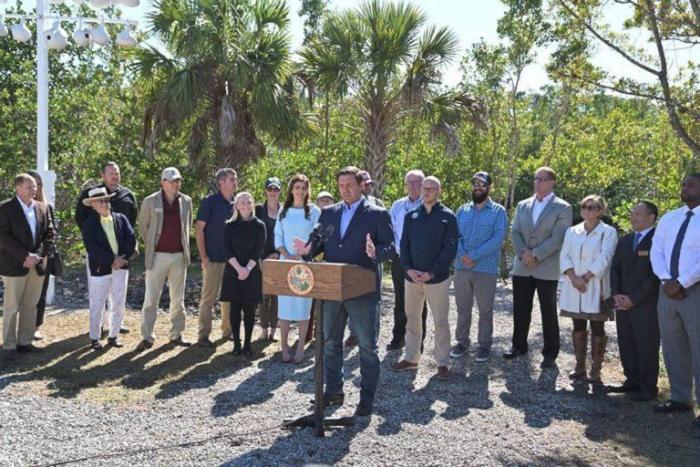
Bonita Springs, Sarasota and Stuart, Florida
Water Policy Reforms Announcement
Governor Desantis meets with stakeholders and announced the Executive Order directing DEP and Florida's water management districts to take immediate, strategic action to achieve more now for Florida's environment.
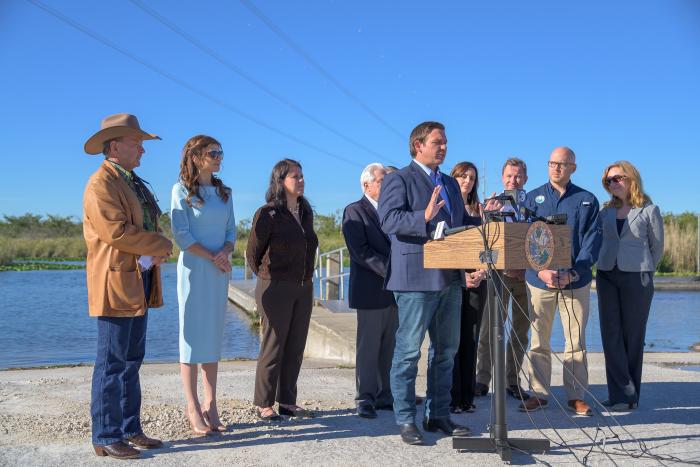
This budget recommendation includes an unprecedented $360 million for Everglades Restoration.
$4 Billion to Protect The Environment
Governor DeSantis recommended to the Legislature a more than $4 billion investment to protect our environment, agriculture and natural resources, including nearly $1.9 billion specifically for the DEP.
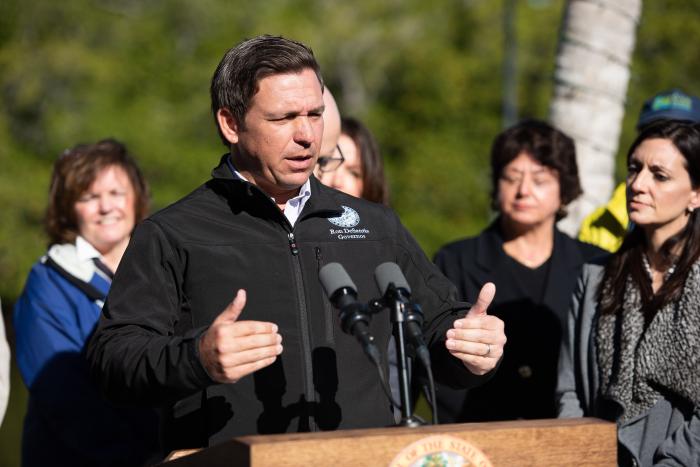
South Florida Water Management District Board
Governor DeSantis requested the resignations of South Florida Water Management District board members and has since appointed eight new members.
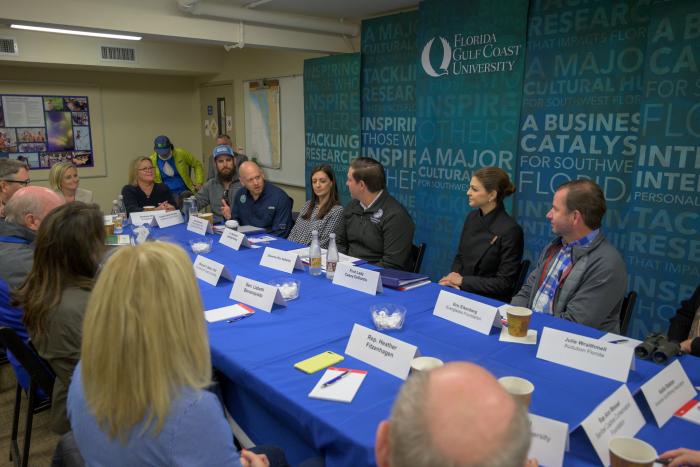
Secretary Valenstein Meets with Stakeholders, Local Officials in Bonita Springs to Discuss Environmental Priorities
Secretary Valenstein joined environmental stakeholders and local officials in Bonita Springs to discuss environmental priorities outlined in Governor DeSantis’ executive order, which calls for immediate, strategic action to achieve more now for Florida's environment.
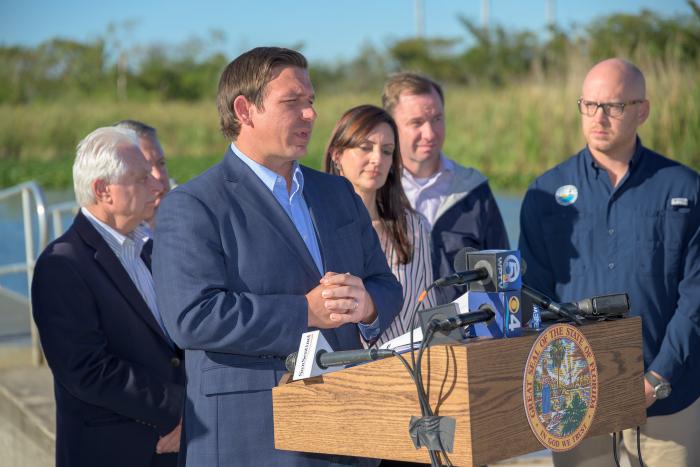
Water and natural resources are the foundation of Florida’s communities, economy and way of life and we must work together to take action to restore and protect the environment.
Executive Order Issued
Less than 48 hours after being sworn in, Governor Ron DeSantis issued an Executive Order outlining his bold vision to achieve more now for Florida’s environment.
